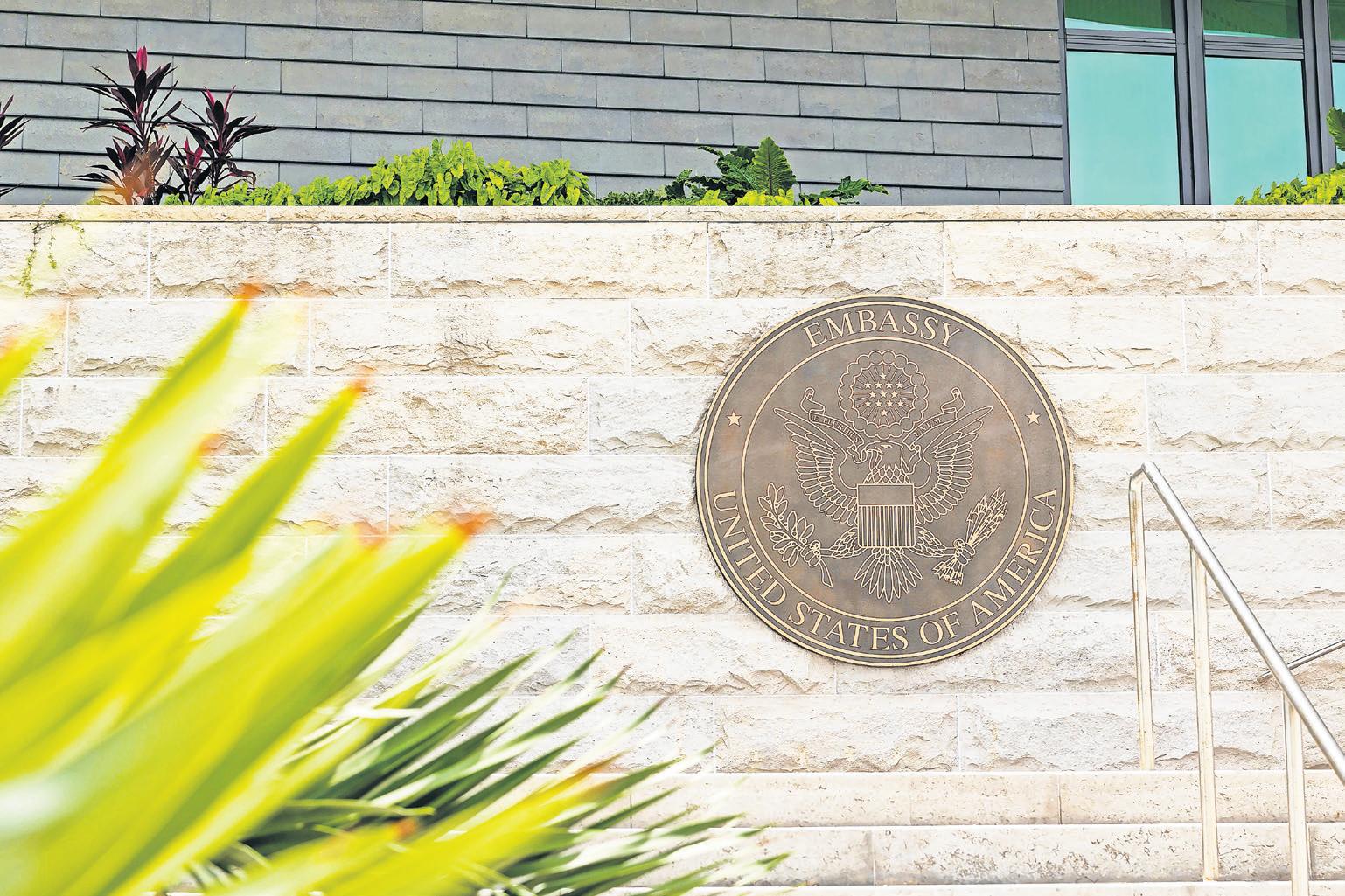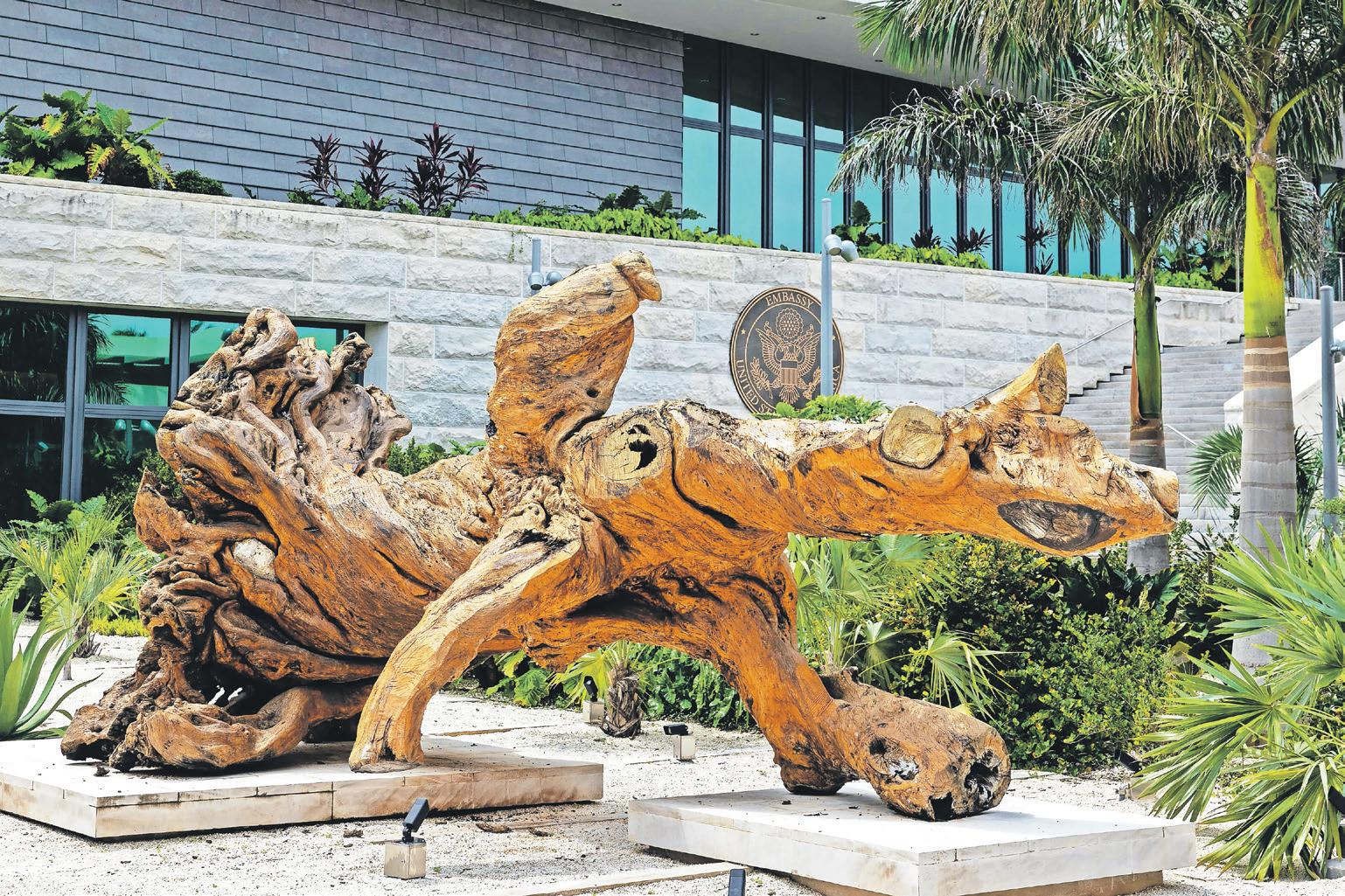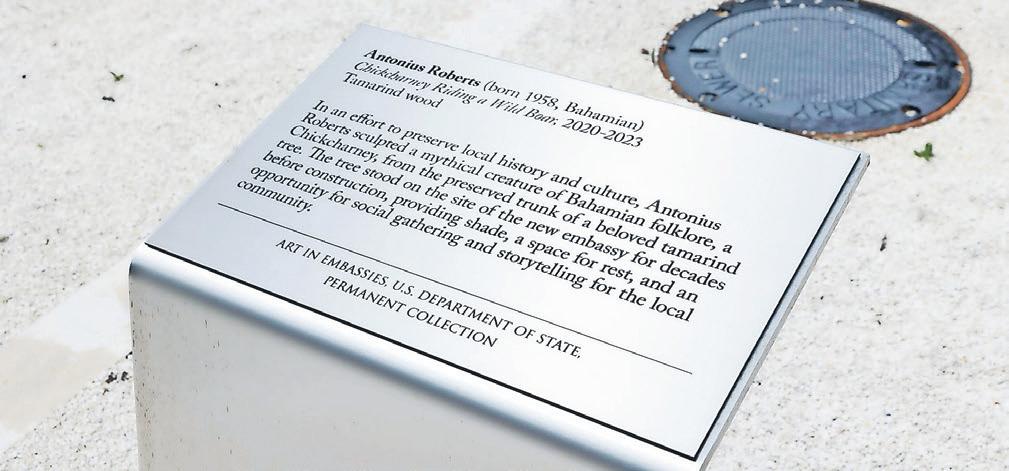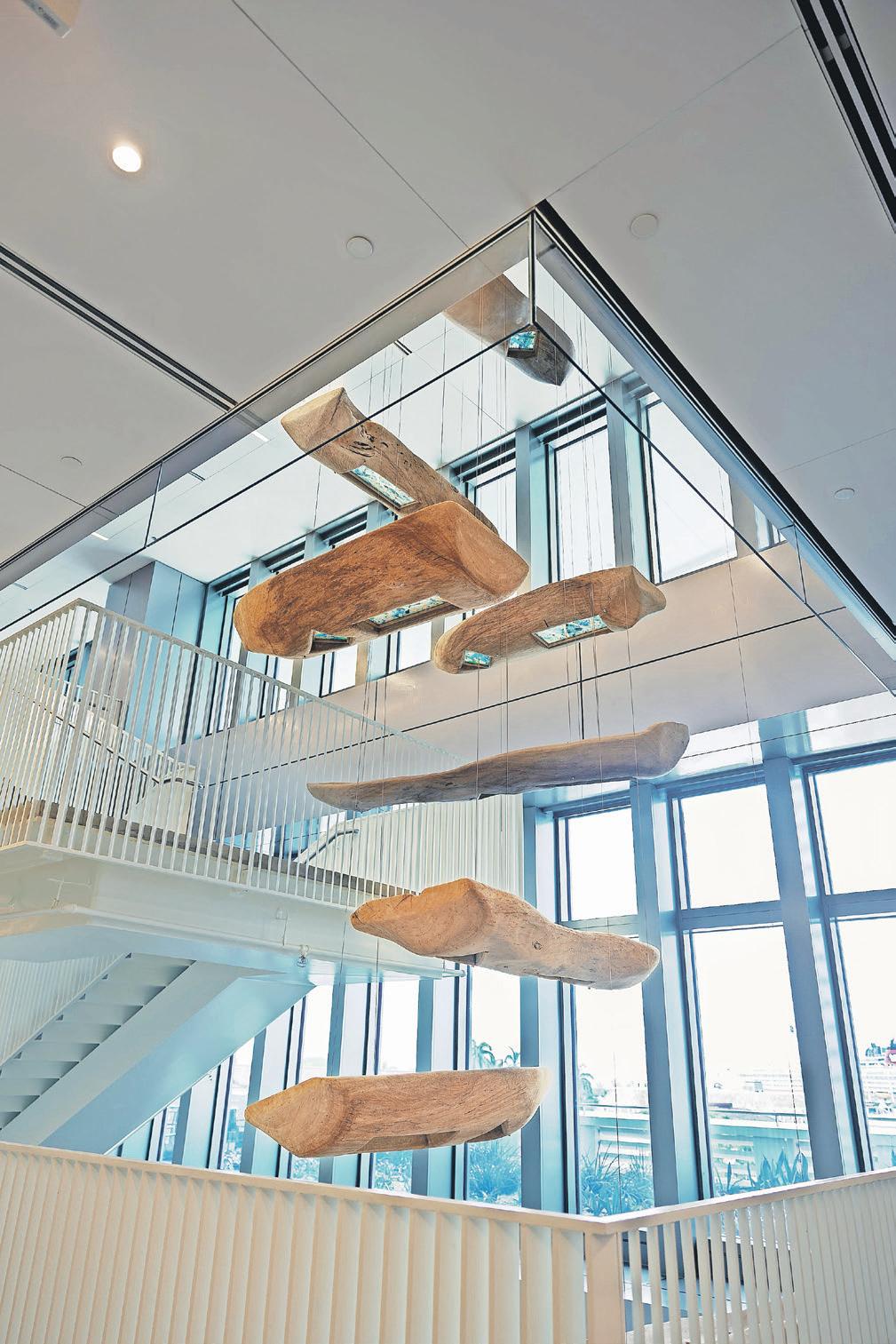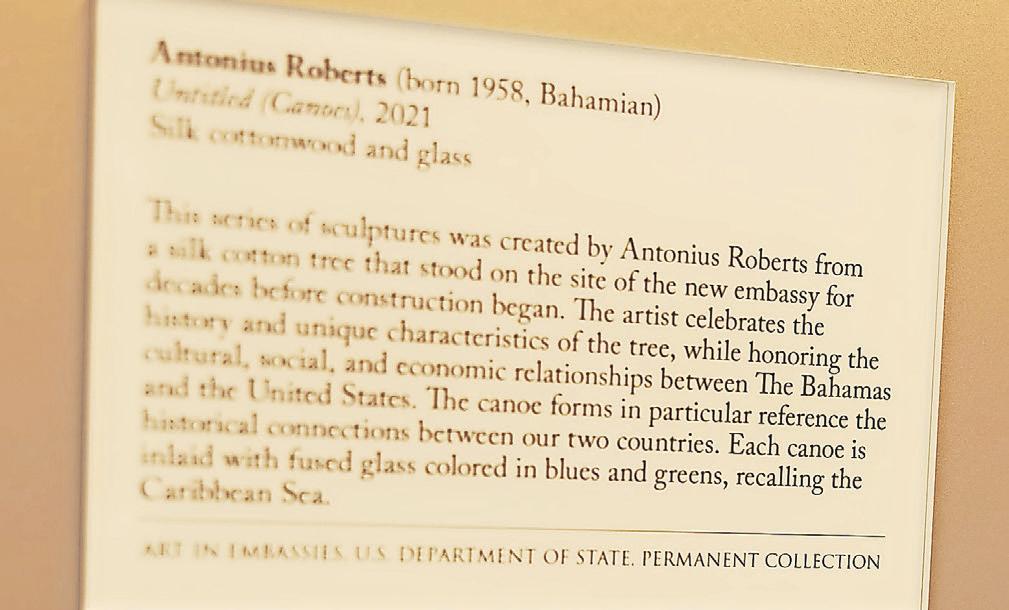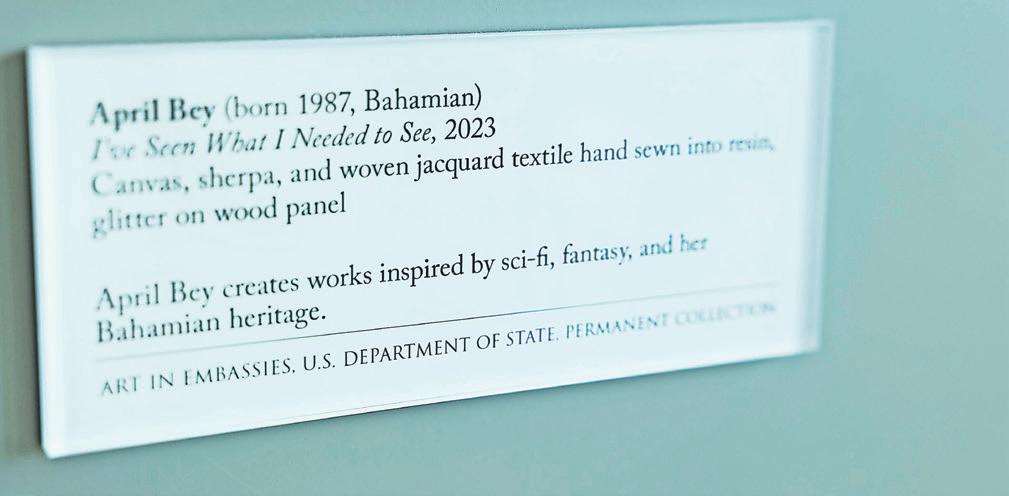








Three police accused of killing Major waive their right to a jury
By PAVEL BAILEY Tribune Staff Reporter pbailey@tribunemedia.net
THREE police officers accused of manslaughter in the 2021 shooting death of 31-year-old Azario Major are seeking a judge-alone trial under legislation passed this year allowing defendants to waive their right to a jury. At a Supreme Court hearing yesterday, attorney
Keevon Maynard, who represents Sergeant 2825 Antonio Sweeting, Sergeant 3039 Jamal Johnson, and Sergeant 3726 Deangelo Rolle, indicated he intends to file an application for a bench trial. If approved, it would be one of the first major cases to test the reform. The move comes more than two years after a
By EARYEL BOWLEG
Tribune Staff Reporter
ebowleg@tribunemedia.net

Michael Telairin told The Tribune yesterday: “I think with the migration issue with the visa, I think the prime minister is in his rightful position to revisit,
THE president of the United Haitian and Bahamian Association has backed Prime Minister Philip “Brave” Davis’ decision to review visa policies for Haitian nationals, saying many in the community agree the system needs revision to ensure measures are applied fairly and effectively.

Mother of traffic victim told him to ‘go home’
By LEANDRA ROLLE Tribune Chief Reporter lrolle@tribunemedia.net
HOURS before she learned her son was dead in an apparent traffic accident, Hazel White urged him to “go home.”
Edwin “EJ” Mark, 23, was later found unresponsive near a utility pole in Ramsey, Exuma, on

‘mixed emotions’ for workers on likely sale of morton salt
By NEIL HARTNELL Tribune Business Editor nhartnell@tribunemedia.net
MORTON Salt’s 100plus Bahamian employees were yesterday said to have “mixed emotions” over the operation’s potential purchase by a Grand Bahama-based energy and natural resources group.
Jennifer Brown, general secretary of BIMAWU, which represents the Inagua-based company’s line staff, told Tribune Business workers were unlikely to be “shocked” by the proposed sale to Lusca Group and its subsidiary, Grand Bahama Salt Company, given the frequency with which ownership has changed in the past two decades. FULL


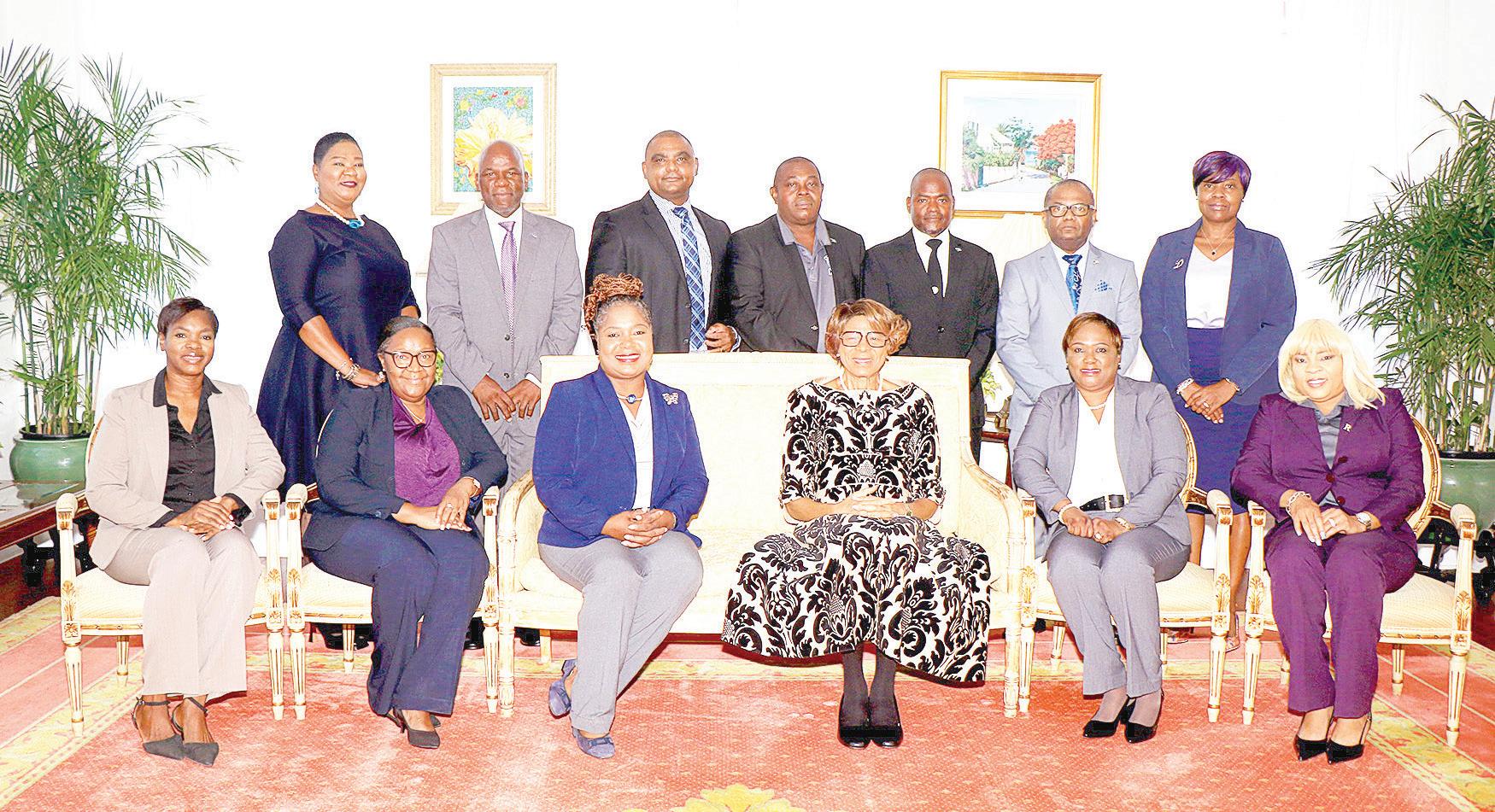


By KEILE CAMPBELL Tribune Staff Reporter kcampbell@tribunemedia.net
THE government expects to spend in the low six-figure range repairing homes damaged by a violent microburst in eastern New Providence over the weekend, Housing and Urban Renewal Minister Keith Bell said.
He said Urban Renewal teams were sent out on Sunday and Monday to assess the destruction, which saw powerful straight-line winds of up to 100 miles per hour rip off roofs, flatten trees and batter properties. While many residents had insurance and are moving forward with claims, Mr Bell said uninsured families will receive direct government support as soon as this week.
“There are a few families who do not have insurance. And so the government, I anticipate by as early as later this week or early next week, they would start to repair some of those homes right away,” he said. Asked about the financial commitment, he added:
“It will be in the very very low six figures. It doesn’t appear to be any more than that, based on assessments from Small Home Repairs.” He said about 15 homes were damaged, with others suffering minor to moderate damage and one
house sustaining “extreme damage.”
Residents told The Tribune they were relieved no one was injured but remained anxious about how long rebuilding would take.
Mr Bell also updated ongoing government housing projects. He said rental homes in San Salvador are on track to open “around December, give or take,” while construction is progressing on subdivisions in Andros at Little Harbour — which has roughly 140 home lots — and Breezy Hill. Additional developments are being considered at Mango Bush and Money Rock. On Eleuthera, housing projects are planned at Ocean Hole and Hatchet Bay, while construction is continuing in Abaco’s Central Pines and Spring City. In Grand Bahama, he cited active work in West End’s Heritage subdivision, West Heights, Bahamia and Garden Villas, though he acknowledged obtaining approvals there has been a “tedious process.”
The minister added that his ministry is exploring ways to encourage Bahamians to return to the Family Islands.
“We are in the process now of considering to construct homes as well as perhaps come up with some sort of a promotion of going back to the island where we’re going to sell the home lots inside there,” he said.
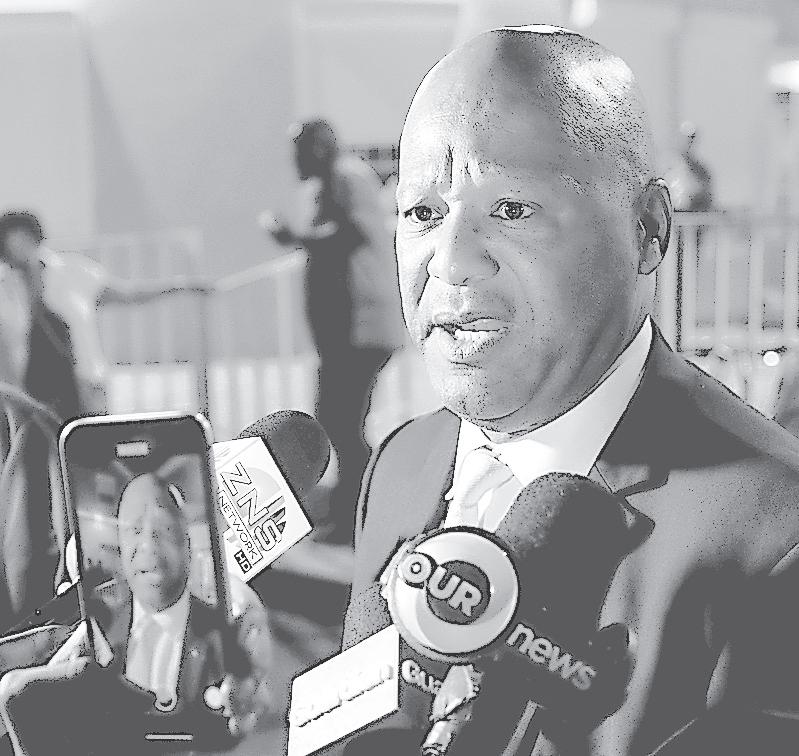
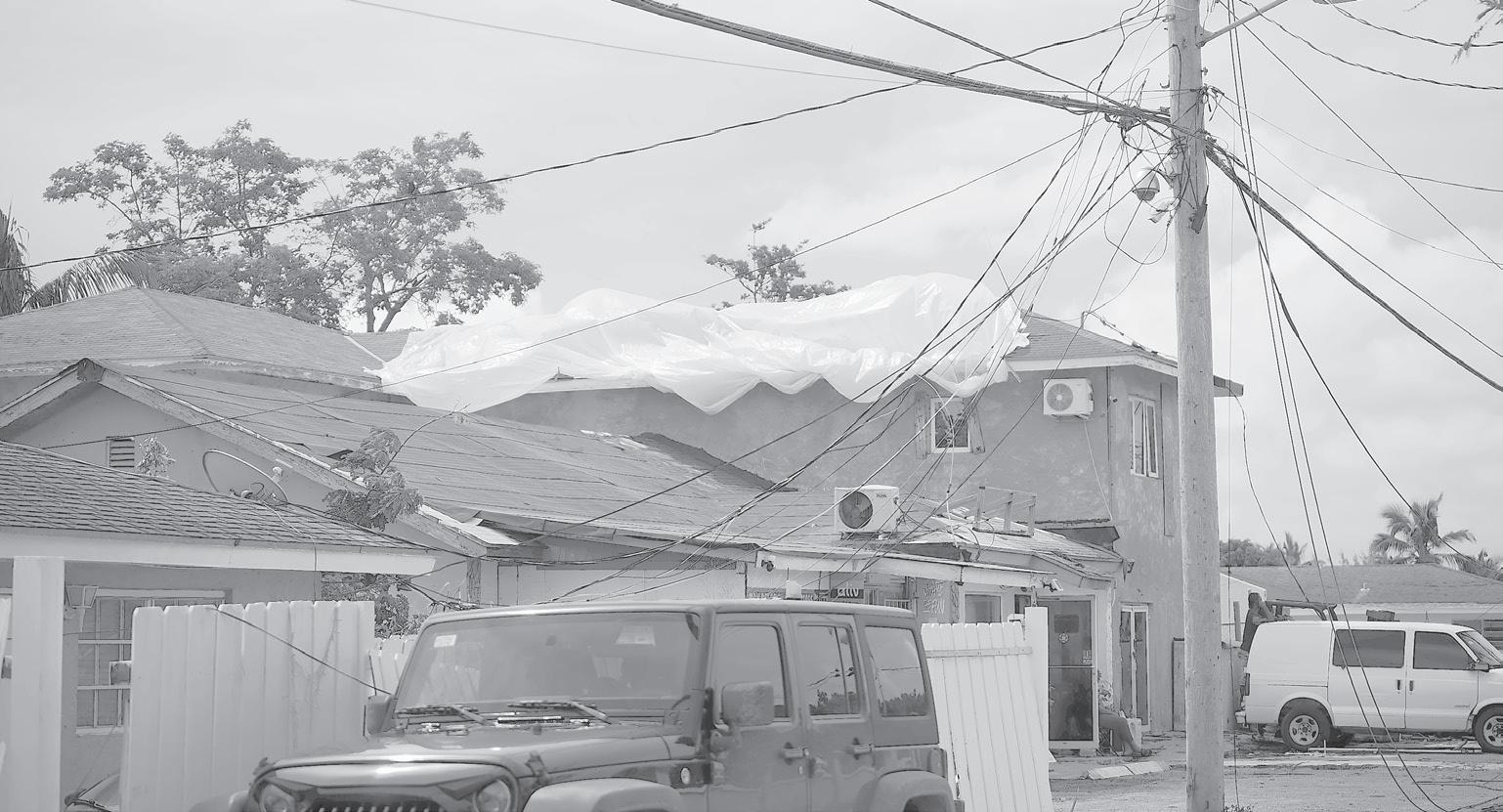

By JADE RUSSELL Tribune Staff Reporter
jrussell@tribunemedia.net
LIVES are being put on the line because ambulances are being tied up ferrying people to routine medical appointments, according to an emergency medical technician.
Stevii Nicolls, who has worked in the field since 2016, says the aim is simple: keep emergency vehicles free for emergencies.
Her warning comes as the country continues to grapple with a shortage of ambulances. On New Providence, officials confirmed earlier this year that only three or four are in service at any given time. Doctors and health officials have cautioned that the problems run deeper than vehicle numbers, citing staffing gaps and
equipment issues that slow response times.
Ms Nicolls said wheelchair users, dialysis patients and elderly people without transport often rely on ambulances for basic trips to the doctor. That, she said, leaves fewer vehicles available when lives are on the line. To help ease the strain, Ms Nicolls is preparing to launch a private non-emergency transport service by the end of the year. She said she has already purchased a wheelchairaccessible van. “I want to fill that grey area where persons don’t need to use the emergency services just to do minor things,” she said. “Which, in turn, will help the emergency system for persons who are having an emergency.” In the meantime, she has been hosting community pop-ups offering free
blood pressure and glucose checks and plans to visit schools to encourage students to consider becoming EMTs.
She said ambulances were having to take patients to doctor’s appointments with crews sometimes having to stay with them. “On the other hand, you have persons that probably need to get to dialysis,” she said.
She added that people without urgent needs sometimes wait hours for transport while critical cases are left competing for attention.
The Public Hospitals Authority announced last year that ten new ambulances were deployed to the Family Islands, with more expected, but many EMTs have complained the vehicles are not properly equipped for all emergencies.
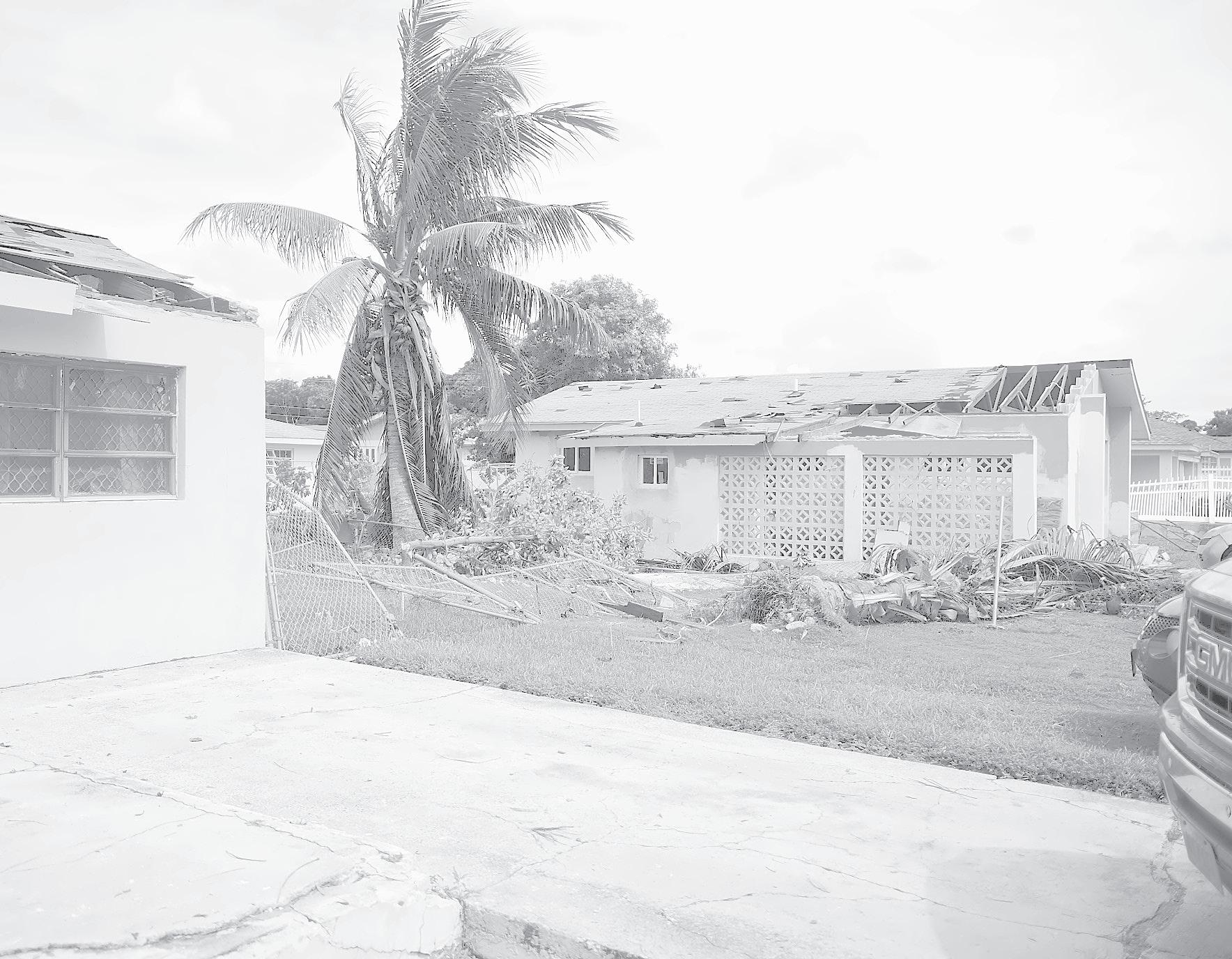

struck his jet ski while he vacationed in The Bahamas. His body was flown home on Thursday in a repatriation ceremony attended by Ms Furnish and officers from the US Armed Forces.
In a statement, the US Embassy said Rosa was not at fault in the incident and confirmed it has asked Bahamian officials to investigate and “pursue justice for his family.”
“This was a needless accident, and it shouldn’t have happened,” Ms Furnish told reporters.
“Anytime the safety of a US citizen is at risk, we’ll be there, and my mantra is: not one more — not one more death, not one more sexual assault of a young US citizen woman.”
For years, the US Embassy has barred its personnel from using jet skis in New Providence and Paradise Island, repeatedly warning American visitors to avoid rentals. The most recent advisory, issued this spring, cited injuries, fatalities and sexual assaults involving rogue operators.
In April, police charged a man with raping a 23-yearold American woman near Junkanoo Beach after she rented a jet ski; that case followed another rape report within the same month, both involving unlicensed vendors.
Facing mounting pressure, the Davis administration this year rolled out a suite of fixed-penalty regulations designed to bring order to the sector. Under the Water Skiing and Motor Boat regulations, people face $1,500 fines for operating unregistered motor
‘The
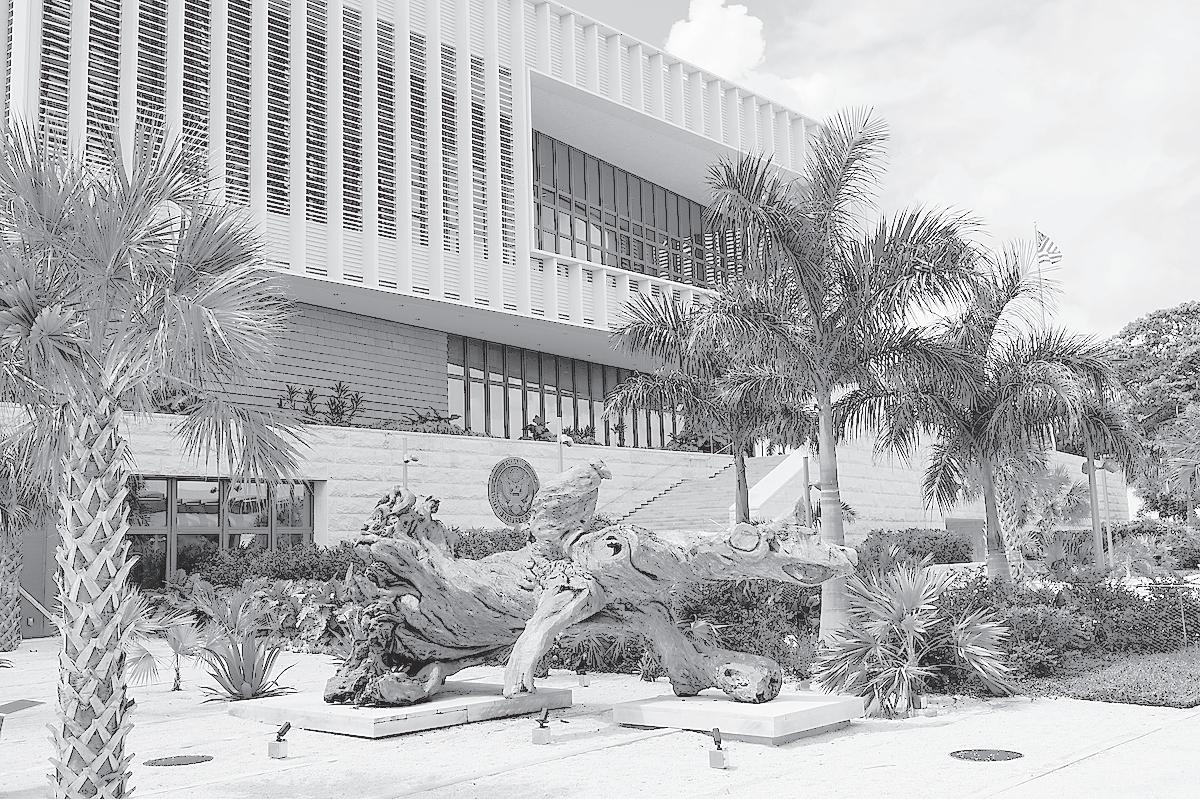
boats, entering restricted zones or driving at dangerous speeds. Failing to wear a flotation device, operating after dark, refusing access to officers, or failing to display a vessel’s registration each carry $1,000 penalties. The Boat Registration regulations impose $1,500 fines for operating unregistered or uninsured vessels, offering craft for hire without inspection or acting as
an unlicensed boat master. Using expired registration or refusing inspection brings $1,000 fines, as do violations involving mandatory tracking transponders. The Commercial Recreational Watercraft regulations introduce penalties ranging from $500 for operating uninsured or unregistered craft to $5,000 for concealing foreign ownership. Operators face
$2,500 fines for reckless conduct or transporting passengers outside designated zones, and $1,000 fines for breaching licence conditions or working within 200 feet of the shoreline. Authorities — including police, Defence Force officers and Port inspectors — now have the power to impound and dispose of non-compliant vessels. It is not clear whether any action has been taken under the regulations. Ms Furnish welcomed the reforms and pointed to cooperation with US agencies, including training programmes and task force work involving the Port Department, police, tourism officials and hoteliers. She noted Baha Mar executive Robert Sands has been a vocal advocate for centralising and regularising the industry. However, she stressed that rules on paper are not enough. “The United States won’t stop in its endeavour to help keep Americans safe and we think regulation is necessary, but arrest and prosecution of those who break those regulations is absolutely necessary,” she said.
By RASHAD ROLLE Tribune News Editor rrolle@tribunemedia.net
THE United States has formally opened its $227m embassy in downtown Nassau, a gleaming new complex that American officials say symbolises Washington’s enduring ties to The Bahamas and its intent to deepen engagement across investment, security and diplomacy.
Kimberly Furnish, the US Chargé d’Affaires, said the five-storey facility — located beside the Supreme Court
and police headquarters with views of Nassau Harbour — represents the kind of presence the relationship deserves.
“We finally have a new Embassy that fits this amazing relationship,” she said in an interview with The Tribune.
“The Bahamas and the United States have always deserved this building, and it’s for both our countries. So, you’re sitting in a $227 million dollar state-of-theart Embassy facility in the heart of downtown Nassau.” From the Embassy
windows, the thousands of Americans streaming off cruise ships can be seen. “We are in the heart of it all,” said Ms Furnish.
The compound houses more than 100 American officers and just as many Bahamian employees. It includes 15 conference rooms, a multi-purpose hall for 150 guests, landscaped grounds for outdoor events, and artwork from Bahamian and American artists through the State Department’s Art in Embassies programme. It is also solarpowered, with excess energy

supplied to surrounding communities.
“This is what this building is meant to do,” Ms Furnish said. “Bringing the public in. Whether we’re doing trade shows, whether we’re having business exchange, community involvement, cultural exchange. This is the heart of what an embassy is meant to do.”
The facility also strengthens the operational side of US-Bahamas cooperation. Ms Furnish highlighted its 24-hour command centre for OPBAT — Operation Bahamas, Turks and Caicos — which coordinates with the Royal Bahamas Defence Force on drug and migrant interdictions.
“This year alone, 1,300 illegal migrants were prevented from travelling,” she said. “We interrupted 176 smuggling events and intercepted 8,300 pounds of drugs. That is the success of Operation Bahamas, Turks, and Caicos with RBDF and with the US. We are literally there 24/7 and that is only growing.”
She said Washington is committed to expanding resources in this area. “There’s a strong move under this administration to ensure that the flow of migrants and drugs are intercepted, so I only see more assets, more support in that area,” she said.
Asked about criticism that Chinese state-backed projects have outpaced US involvement in The Bahamas, Ms Furnish pushed back strongly, insisting American investment is larger and more robust than many realise.
“US investment has never gone anywhere,” she said, pointing to recent projects: a $100m US-EXIM bank loan for LNG turbines, Rosewood’s $200m development in Exuma, Carnival’s $600m Celebration Key in Grand Bahama, and Royal Caribbean’s $250m project on Paradise Island.
She also cited the Western Atlantic University School of Medicine, a $50m US-backed institution in Grand Bahama, and noted that hotels like the Grand Hyatt at Baha Mar are themselves major American investments.
“I think what we could do a better job of is highlighting all of those wonderful investments because it’s happening every day,” she said. “US private investment is US investment in The Bahamas.
That’s not going anywhere.”
The embassy’s opening coincides with Washington’s effort to restore a full ambassadorial presence in Nassau. The Bahamas has not hosted a US ambassador since 2011, with chargé d’affaires serving as the top envoy in the meantime.
Ms Furnish said officials are closely watching Herschel Walker’s confirmation process in Washington.
“An ambassador is a hugely symbolic and important person in the relationship between two countries,” she said. “And like The Bahamas deserves this beautiful Embassy, they deserve an ambassador, so we’re working hard to get Mr Walker here and give The Bahamas that ambassador that they deserve.” The new embassy marks not only a larger physical footprint but a platform for more frequent cultural exchanges, business dialogues, and public functions, according to Ms Furnish. She said the embassy’s old property on Queen Street is being decommissioned and will likely be sold.
“When I came in and saw all of our employees and officers in their desk spaces and working, that’s when the building really felt alive,” she said.
“People are what really make a building. And the second-best day was the day that we opened to the public — Bahamian visa applicants coming through the doors, Americans getting passports and birth certificates. That’s what this building is here for, and that’s a beautiful thing.”
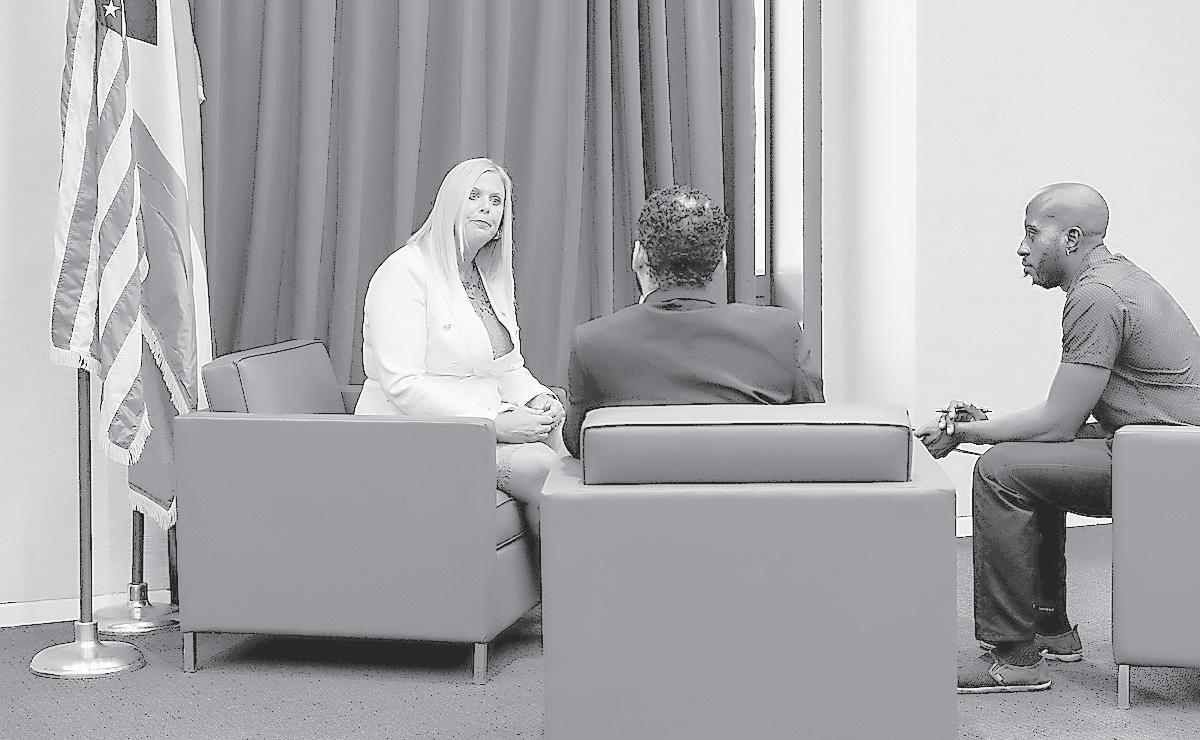
By RASHAD ROLLE Tribune News Editor rrolle@tribunemedia.net
THE top United States diplomat in The Bahamas has stressed that the US will not pressure this country to admit Haitian nationals for visa purposes after concerns swirled over Nassau being named a processing point for Haitians.
US Chargé d’Affaires
Kimberly Furnish’s assurance - in an interview to mark the opening of the new US Embassy in Nassau - came after the Davis administration rejected allowing Haitian nationals to come here to apply for US visas. Officials said the new American designation “will result in no additional entries to The Bahamas,” emphasising that the US, under the Trump administration, has already restricted entry to Haitians.
“The sovereign right of the Bahamas is to issue visas to who they see fit to enter their country, and the United States has no intention of pressuring The Bahamas to issue visas to any nationals of any country,” Ms Furnish said. However, she also noted that the embassy in Nassau had long handled Haitian applications. “We’ve
“The sovereign right of the Bahamas is to issue visas to who they see fit to enter their country, and the United States has no intention of pressuring The Bahamas to issue visas to any nationals of any country.”
always interviewed Haitian applicants, whether they’re resident in Haiti or they’re visiting for the purposes of a visa application,” she said. “There are certain embassies around the world that can’t provide those services, and our Embassy in Portau-Prince is one of those right now. It’s a challenging situation in Haiti, so we will continue to interview Haitian applicants as we always have. That is not a change. I don’t expect that that will create any surge in Haitians coming here.”
Asked why Nassau was chosen instead of other countries, such as the Dominican Republic, Ms Furnish said the embassy here was well-positioned to take on the role. “We know that there are flights coming from Haiti to the Bahamas currently,” she said. “We know there’s capacity with [our] beautiful new consular
section, and we have Haitian Creole speakers in our consular section as well.” She also clarified that the Trump administration’s restrictions do not apply to all Haitians. “With the new policy, we have seen a slight dip in Haitian nationals applying, and that’s to be expected,” she said. “Honestly, the categories of Haitians that we would see coming here would be very specific ones,” she said, mentioning diplomats or family-based immigrant visa applications. “Those are very small in number too. I’ll say we see the numbers declining.”
The State Department’s decision to shift visa processing from Port-au-Prince followed the suspension of routine consular services in Haiti, where armed gangs now dominate large areas and instability has crippled government institutions.
By RASHAD ROLLE Tribune News Editor rrolle@tribunemedia.net
THE United States has for the first time publicly backed The Bahamas’ overhaul of its system for hiring Cuban professionals, praising the move to pay workers directly rather than through Havana’s state agencies.
The US had warned that participation in Cuba’s state-run labour-export programme could trigger visa sanctions for officials and their families.
Leaked contracts published by Cuba Archive earlier this year indicated The Bahamas was paying up to $12,000 per medical professional per month but Cuban professionals
received roughly $990 to $1,200, with the balance retained by Comercializadora de Servicios Médicos Cubanos.
In June, Health Minister Dr Michael Darville said Cuban healthcare workers would be hired directly by his ministry rather than via intermediaries, and that existing deals could be cancelled, with those unwilling to accept new terms expected to return to Cuba. US Chargé d’Affaires Kimberly Furnish said: “This has been a very strong policy point for the United States under the Trump Administration and particularly for Secretary Marco Rubio. The US feels strongly that those policies are human rights issues. All people deserve
to have their salaries given directly to them without their government intervening in that. So, we’ve worked very closely with the Bahamian government to ensure that if there are Cuban Nationals working here, that they’re being paid directly and treated humanely. We are very proud of the Bahamian efforts to make that so, and we see success in that effort.”
Her remarks amount to Washington’s first public cosign of reforms the Davis administration adopted this year after months of friction over the old model, which routed contracts through Cuban state agencies.
Education authorities have said more than 100 Cuban teachers are set

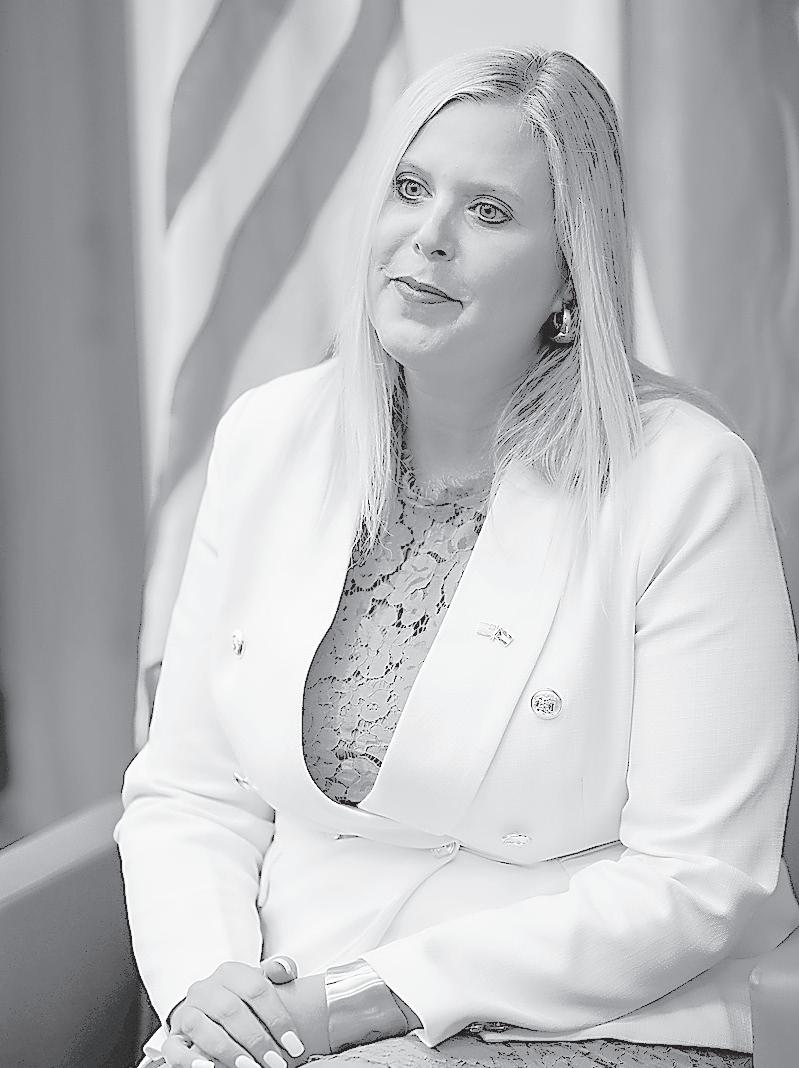
to return under a revised framework that places contracts directly with the Bahamian government, relieving pressure in classrooms facing shortages across language arts,
technical studies, early childhood education, performing arts, physical education, and health and family life.
Meanwhile, Dr Darville said last month that the Cuban medical professionals
remain in the country as The Bahamas negotiates with the US over its proposal to directly contract them.
See PAGES 15 and 17 for more photos.

NULLIUS ADDICTUS JURARE IN VERBA MAGISTRI
“Being Bound to Swear to The Dogmas of No Master”
LEON E. H. DUPUCH
Publisher/Editor 1903-1914
SIR ETIENNE DUPUCH, Kt., O.B.E., K.M., K.C.S.G., (Hon.) LL.D., D.Litt .
Publisher/Editor 1919-1972
Contributing Editor 1972-1991
RT HON EILEEN DUPUCH CARRON, C.M.G., M.S., B.A., LL.B.
Publisher/Editor 1972-
Published daily Monday to Friday
Shirley & Deveaux Streets, Nassau, Bahamas N3207
TELEPHONES
News & General Information
(242) 502-2350
Advertising Manager (242) 502-2394
Circulation Department (242) 502-2386
Nassau fax (242) 328-2398
Freeport, Grand Bahama (242)-352-6608
Freeport fax (242) 352-9348 WEBSITE, TWITTER & FACEBOOK
www.tribune242.com


OUR closest neighbour has opened up their new house in town – and it is quite the sight. The new United States embassy in downtown Nassau has opened. It has a price tag of $227m and it is the new face of what has been and remains one of our most special relationships.
US Chargé d’Affaires Kimberley Furnish said as much to The Tribune, saying: “We finally have a new embassy that fits this amazing relationship.”
There are a few things that stand out immediately about the new embassy –not least of all its visibility. The sight of it dominates Shirley Street as you pass it, rather than the previous building which was tucked away from the main street. The new building is a statement. Given that it is a statement, it is important to look at what exactly it is saying.
For starters, the building is built to have more open areas that can be used for events. Ms Furnish talks of “bringing the public in”, saying: “Whether we’re having business exchange, community involvement, cultural exchange. This is the heart of what an embassy is meant to do.”
Then there is the artwork on show around the building. There is American artwork, of course, but also Bahamian artwork. Two cultures entwined, perhaps seen most strikingly by a piece of artwork created by Bahamian artist Antonius Roberts, who created a sculpture from a 200-year-old tamarind tree that stands outside the main building.
There is no reason the US had to give such thought to bringing two cultures
together in such a fashion – it was a choice. Choosing to do this speaks volumes.
Ms Furnish was also keen to speak up about US investment – and the prospect of further investments.
She said: “US private investment is US investment in The Bahamas. That’s not going anywhere.”
All this comes of course at a time when international rivalry between the US and China has led to some diplomatic sparring – and plenty of questions for the nominee to become the next US ambassador, Herschel Walker. His Senate confirmation hearing put the focus squarely on Chinese influence in the region, as well as tackling issues about drugs. But while those issues are doubtless going to be on the agenda, the new embassy is also a statement about opportunity.
The chance to have greater dialogue, greater access and, yes, greater opportunity has to be welcomed.
Our neighbour’s new home is to be celebrated. And with it the chances that may come to renew and add to the partnerships we have had in the past – and will have in the future.
There will be plenty of discussions ahead. There already have been over Cuban workers. And we ought to listen to our neighbour on issues such as jet ski safety and, yes, tackling drugs – both issues that matter to us as much as the US.
When we all pull in the same direction, we are far likelier to make progress.
EDITOR, The Tribune. STRAY animals are everywhere in Nassau. We see them on our streets. Many are thin. Some are sick. All of them are in need of food, shelter, and love. This is a problem that can no longer be ignored. While more education about responsible pet ownership is needed in The Bahamas, we must also face the urgent need in front of us. Groups like BAARK Bahamas are doing their best by spaying and neutering as many animals as they can, but it is not enough. We desperately need a place today where animals can be properly cared for. Euthanising them is not the answer. It is only a temporary response to a problem that needs a real solution.
I am asking our community to join together to build a sanctuary for these animals. A sanctuary would provide food for the hungry, medicine for the sick, safe shelter from the weather, and open spaces where dogs and cats can move freely and feel cared for. To make this happen, the sanctuary will need volunteers to help with feeding and care, paid staff to keep daily operations running, donations of food, medicines, supplies, and most importantly, funds. Builders, fundraisers, and planners will also be needed to create and sustain the sanctuary for the long term. Support can come from many places. Local businesses, food suppliers, veterinary clinics,


EDITOR, The Tribune.
WE have just passed the four-year mark for the Davis administration. The Progressive Liberal Party (PLP) is now finishing up the last year of its term in office.
The PLP promised a “new day” if elected. They said they would ensure the cost of living was reasonable. They said they would fix infrastructure problems. They said they would deal with the crime problem. They said they would be good stewards of the people’s money.
They have not had to govern during a pandemic or after a major hurricane or series of hurricanes. Despite this, what we have four years later is a party with few achievements. Frustration among Bahamians has increased every year.
The people’s business is not getting done. What has happened is the governing party has acted for and on behalf of PLPs.
PLPs have gotten contracts. PLPs have gotten jobs. PLPs have received land grants. PLPs have gotten rich. Prime Minister Philip Davis has governed for his own and left ordinary Bahamians to fend for themselves in a cost of living and affordability crisis.
pharmaceutical companies, and even international animal welfare groups could all play a role by donating funds, food, medicine, and supplies. Churches, schools, and civic groups can also join in to support this effort.
Don’t you want to see stray animals off the streets, knowing they are safe and cared for? This can make for a safer and healthier Bahamas for all of us.
Our animals are suffering, but together we can change that. Please consider offering your time, your skills, and your funds. Contact BAARK Bahamas to learn more about how we can get this project underway.
LATESHA CLARKE September 15, 2025.
Prices have been elevated since the pandemic-related inflation shock. Bahamians watched on a monthly basis as prices increased for the items they require to live, as well as rent. Prices remain elevated.
What has made things worse in The Bahamas is that the Davis administration added a breadbasket and medicine tax of 10 percent value-added tax (VAT), and they discontinued a hedge at Bahamas Power and Light (BPL) that the last Free National Movement (FNM) administration left in place to protect the people. These decisions made things even more expensive for homes and businesses.
We in the opposition, along with members of the clergy and media, called on the PLP to cut the breadbasket tax for years. The hard-hearted administration would not listen. It was not until this year that the Davis administration reduced from ten percent to five percent certain items at the grocery store, medicines and other items we had at zero percent VAT. The people were left to suffer for years under the Davis breadbasket tax.
The prime minister has demonstrated an aloofness and indifference when
it comes to his people. He does not feel what ordinary Bahamians feel. For example, the people have also been crying out for relief from high electricity bills, many of which have doubled.
No matter what policy the PLP announces or what new energy reform they say they are enacting, the bills have remained high. The prime minister has been unwilling to use the awesome powers of his office to meaningfully intervene and bring relief to struggling Bahamians who are traumatised each month by high BPL bills.
Mothers and fathers are having to cut back on expenditure in their households in order to be able to try to keep up with their electricity bills. Some people are using their savings to keep the lights on. This is not what voters expected when they signed up for a “new day”. While Bahamians have been struggling with high costs, they have been getting poor services from utility providers. This has been especially the case in certain Family Islands.
The electricity goes out regularly. The water goes out. Sometimes it is both at the same time. The island of Eleuthera gave the PLP its two seats. It has been treated the worst when it comes to electricity and water services.
Here in New Providence the PLP can’t even patch the potholes in the streets.
The roads are dangerous with all the holes all over the island. This will be one of the worst five year-periods for murders when the PLP’s term is done. The killing numbers were high since the PLP’s first full year in office (2022) when we had 128 murders, the second most in our history.
High levels of killing continued throughout their term. This year there has been a decline. However, so many people were killed in the previous years that this five year term is still likely to be one of the bloodiest on record. In their election Blueprint we were promised enhanced “crime fighting methodologies” in their “aggressive war against crime”. Instead, residents of New Providence have had to spend most of this term watching high levels of killing, many thefts and too many robberies. There is a common
connection between the failures of this administration in the cost of living and crime crises. In both cases we have a prime minister who has failed to act to make things meaningfully better for the people. Inequality has gotten worse under him.
This prime minister has had a different focus. He has traveled more around the world at the people’s expense than any prime minister in one term in office. He has visited nearly every continent. He has stayed in the finest luxury suites. He has taken expensive plane rides. He has eaten the most expensive foods and drank expensive wines.
Staying at his desk and doing the people’s work bores him. He is in power for the perks, not the people.
Consequently, things do not get done. After four years there is no new airport in Grand Bahama. After four years there is no hospital in New Providence. Refurbishments at the Accident and Emergency Department at Princess Margaret Hospital (PMH) are still not complete.
After four years the Grand Lucayan has not been redeveloped. After four years there is no new Parliament or prison. The list of what has not been done is long. It could fill a page in the newspapers.
Philip Davis wants another term in office. He wants to keep enjoying the good life paid for by the people’s taxes. He wants to keep jet setting. He wants to keep partying with rich foreigners.
The people have seen how he governs. He will not change. His government has failed to keep most of its promises. The Davis administration has been very secretive. It has refused to answer many questions on how they are spending the people’s money.
I have worked to improve opportunities for my constituents for nearly two decades. The residents of Killarney do not want more of the same old PLP.
The PLP is no good for The Bahamas. Phillip Davis is no good as prime minister. Bahamians deserve better than what the governing party has offered these four years. We must all continue to do our part to ensure that the Bahamian people have a voice to speak out for justice and fair play, for opportunity for all. This is what our people deserve.

Coroner’s Court jury found Major’s death to be homicide by manslaughter. The officers are accused of fatally shooting him in his car outside a bar on Fire Trail Road on December 26, 2021.
Justice Guillimina Archer-Minns told the men their trial is scheduled to begin on June 1, 2026, with a status hearing set for February 25, 2026. If the matter cannot proceed on the scheduled date, an alternative trial date of March 8,
2027, has been fixed. Mr Maynard has previously raised concerns about the potential effect of pretrial publicity on jurors. In March, Parliament passed a bill giving defendants the option to waive jury trials. Prime Minister Philip “Brave” Davis said the change, which mirrors practices in countries such as the United States, Canada, and the United Kingdom, would help guard against jury bias, shorten trials, and improve efficiency. Former chief justices also endorsed the move at the 25th anniversary of the Eugene
Dupuch Distinguished Lecture, saying jury trials posed ongoing challenges. Still, the reform has its critics. Long Island MP Adrian Gibson warned a single judge could bring personal biases to bear on a case, suggesting a threejudge panel would be a better safeguard despite higher costs. East Grand Bahama MP Kwasi Thompson questioned whether defendants would even pursue judge-alone trials, noting Bahamians are accustomed to juries and many may prefer to take their chances with them.
Saturday with his motorcycle nearby. His helmet and one of his shoes were discovered some distance from his body. His death came just weeks after he bought the motorcycle as a gift for his 23rd birthday in August.
“I said ‘EJ, you riding your bike, it’s dark, go home.’ So he say, ‘mummy, I ain’t drinking you know. It’s just one Guinness,’” Ms White recalled. He promised to call once he made it back from the local Fish Fry, but that call never came.
Police say there is no evidence to support the family’s belief that he may have been struck by another vehicle. Chief Superintendent Kenrid Neely, officer in charge of Exuma, said there was no damage to the bike, no road markings, and footage from a nearby business showed Mark leaving at 3.07am in the rain. He said investigators will await the autopsy report to determine his cause of death.
Still, Ms White struggles with unanswered questions, insisting her son was a cautious driver. “Why,” she asked, “his helmet is all the way down the road, far away from him, and
one of his shoes on the next part? If he slide, he would have slide with his shoes on.”
“I lie down in that spot and my chest was so heavy,” she said. “My heart was hurting me and I said Lord, if somebody hurt him, they should have no peace in their life but if it’s your will, I thank you.”
The mother-of-six said she and her son shared a close bond, speaking daily and ending each conversation by saying they loved one another.
On the night he died, she fell asleep waiting for his promised call. The next morning, preparing for a funeral, she sent him another message. Instead, she received the news that would shatter her life: her “baby is dead.” She said he was a quiet, humble young man with a promising future.
“Everybody on the island, from the airport go to Georgetown, everybody I spoke with, not one day a problem out of him,” she said. “All the old people over there, grieving.” Mark, a landscaper at Sandals, had embraced Exuma life over the past two years after moving from New Providence. He loved the beach and his work, and had recently bought property in Eleuthera. “His plan was
By PAVEL BAILEY Tribune Staff Reporter
pbailey@tribunemedia.net
A MAN was denied bail yesterday in connection with the 2022 shooting death of a rival gang leader on a bus. Prosecutors allege that 29-year-old Glenardo Johnson shot and killed Giovanni Lafleur after he exited a 15A bus Lafleur was driving near Popeye’s on Robinson Road at around 10am on October 4, 2022.
A 16-year-old boy who was helping collect fares was also injured during the incident. At the time of his death, Lafleur was on bail for the alleged murder of Luternier Excelus on May 8, 2015.
Johnson was denied bail on a murder charge before Justice Guillimina Archer-Minns.
He maintained his innocence and asked to be released so he could prepare

to come home in June to go to Eleuthera to clear down his property and put down his foundation,” Ms White said.
This latest accident brings the country’s traffic fatalities to 51 for the year, according to The Tribune’s records.

his defence. However, Justice ArcherMinns ruled that Johnson was not a fit candidate for bail. She said there was reliable evidence linking him to gang affiliations and noted that the deceased was believed to be a lieutenant in a rival gang. The judge said she was reasonably satisfied that Johnson posed a risk to public safety, adding that public safety and order outweighed his right to bail. She also found that his safety could be at risk if he were released, given the chance of retaliatory violence.
Justice Archer-Minns ordered the prosecution to proceed with its case no later than the first quarter of 2026. If it fails to do so, Johnson will be entitled to reapply for bail. Until then, Johnson will remain on remand at the Bahamas Department of Correctional Services.
By PAVEL BAILEY Tribune Staff Reporter pbailey@tribunemedia.net
A MAN was sentenced to 24 months in prison after admitting to carrying a loaded gun on a motorbike last weekend.
Police said 20-year-old Schneider Dorelus was found with a black Taurus TH9C 9mm pistol and nine rounds of ammunition while riding a motorbike on Sixth
Street around 8pm on September 13
Dorelus pleaded guilty to possession of an unlicensed firearm and possession of ammunition before Chief Magistrate Roberto Reckley. After accepting the facts of the case, Chief Magistrate Reckley sentenced him to two years at the Bahamas Department of Correctional Services. Inspector Deon Barr prosecuted the matter.

“Beauty will save the world.” –
Fyodor Dostoevsky, The Idiot
WHEN Aquinas College moved from Palmdale to Gladstone Road some years ago, something remarkable unfolded. The school experienced significant improvements in educational outcomes in myriad areas.
This included academic achievement, character development, and spiritual growth. Of significance is that male students are doing as well as female students in many subject areas, often on par. There are various ingredients in the school’s recipe for success.
This includes the stellar leadership of principal Shona Moss Knowles, a veteran and innovative educator, alongside her dedicated staff. Still, the main ingredient that boosted male achievement appears to be the quality of the natural and built environment of the school, shaping the mood and horizon of students.
In erecting the modern campus, Archbishop Patrick Pinder envisioned a welcoming and safe environment, a place of beauty!
He spared little effort in ensuring quality classrooms, modern technical-vocational facilities, a well-appointed library and learning center, quality performing and visual arts spaces, and a well laid out campus.
The campus enjoys a labyrinth, a gardening area, and a peace pond as part of its broader environmental and spiritual development programmes.
A former Aquinas school teacher after he was ordained a priest, 45 years ago, Archbishop Pinder, along with others, had a compelling vision for the quality of the campus. That

vision has affected student desires and outcomes.
The boys want to come to school. They want to learn. They are realizing certain expectations because they believe others are investing in their holistic and experiential education.
As noted last week, a teacher told this columnist years ago of a male student who switched schools in a sister Caribbean country.
The campus he moved to was more peaceful. It had more trees and foliage. Our environment makes a difference in the quality of our living and learning.
The young man remarked of his new school, “I feel I can breathe!” His mood improved, his grades improved, and his life outcomes improved significantly. We need to create learning, diversionary, and intervention spaces where young people feel they can breathe and not feel overwhelmed.

‘Let us make more things beautiful in The Bahamas to save and to enrich the lives of more of our beautiful children and youth, and our own lives!’
Many young people, including those at-risk and those who feel abandoned, have few spaces to breathe in cramped urban spaces, poor home environments, and a number of government-operated schools not fitted and prepared for their needs. There are governmentoperated schools which do a good job educating students. There are many dedicated administrators and teachers who have devoted their lives to public education and the nurturing of talent. Numerous public school graduates are among our leading citizens. Still, more is needed today, especially in targeted diversionary and intervention programmes amidst the deep-seated and widespread social dysfunction threatening the lives and long-term prospects of scores of young people, especially boys and young

men. We do have intervention programmes. But they are too small! Just as we need ongoing modern and smart upgrades to physical infrastructure, we need a social intervention ecosystem and infrastructure with a diversity of strategies, models programmes, and facilities. Government has a critical role in diversionary programmes, especially in the areas of funding and oversight. However, just as the country required a Nassau Airport Development Company to run LPIA, we need similar public-private partnerships to run social intervention initiatives.
Both Simpson Penn Centre for Boys and Willi Mae Pratt Centre for Girls should be thanked for their many fine efforts over the years. Still, many recognise that the centres should be expanded and modernised with greater emphasis on experiential learning and diversionary efforts similar to more successful programmes internationally. Government has often done a fair to poor job in intervention. This is not just a Bahamian phenomenon. It is the role of the entire society to foster family life and community development. Government alone cannot prevent and combat crime and violence. Correspondingly, government cannot be the sole and in various instances, the major agent of diversion and intervention.
A recent news story highlighted the concern and frustration of National Security Minister Wayne Munroe and Education Minister Glenys Hanna Martin, over the need for housing for atrisk and other youth who require alternative living arrangements other than their difficult family circumstances and home environments.
The ministers clearly want alternative housing as soon as possible. But beyond the development of a physical facility there should be a broader vision for such housing. They must ensure a welcoming and beautiful space not just a building. If the government simply sets up the traditionally run government facility, it will fail in many ways. It will fail because of a lack of ambition and programmatic imagination. It will be stifled by certain bureaucratic mindsets and poor management. There will be considerable political interference and cronyism. It will be hobbled by staffing problems and funding shortfalls. There will be all manner of theft and related problems. It will become rundown and likely poorly
maintained. It will risk becoming a warehouse instead of a new home for children and youth in need of beautiful spaces and programmes to help restore often bruised lives. Alternatively, the government could enter a management agreement with former educators and others who will manage the facility, with the ability to easily hire and fire staff. The government must have clear oversight because it will be publicly funded. There must be vigorous health, safety and security protocols. Nevertheless, imagine such a facility being run by a not-for-profit consortium of retired educators, who are well paid and not political cronies. This is the kind of new vision we need to run more of our diversionary and social intervention programmes.
The Davis Administration recently launched the Creative and Performing Arts School (CAPAS). This is an exceptional idea that has been touted for years. It will succeed if it has sustained public financing and private support.
It should be modelled in part on the National Art Gallery of The Bahamas (NAGB), which has maintained quality programmes and been an incubator for the visual arts. NAGB has succeeded in great part because of its leadership. At its inception, it was led by founding director and chief curator Dr Erica James, who ensured that the institution was not dumbed down through mediocrity and crass political interference.
Others, like Amanda Coulson and John Cox, and various board and staff, continued this legacy in their respective roles at the Museum.
CAPAS must ensure a similar quality of leadership and public support. It should receive funding to restore or build a beautiful facility.
Likewise, a facility cum programme for housing for students in the government-operated school system can improve the lives of more of our young people. However, it will only succeed if it takes inspiration from Bahamas and international success stories in how to intervene in meaningful and beautiful ways.
Let us borrow compelling inspiration from Fyodor Dostoevsky, who imagined, “Beauty will save the world”. The Russian novelist was referring to moral and aesthetic beauty.
Let us make more things beautiful in The Bahamas to save and to enrich the lives of more of our beautiful children and youth, and our own lives!
“THE Brits really know how to do this ‘pomp and circumstance’ thing, don’t they?” An Anglophile friend was commenting on the magnificence of the reception Donald Trump is getting in London and the UK this week. The “special relationship” between the United States and the United Kingdom underlines once again the many aspects of the closeness of these two powers, and what we’re witnessing on our TV screens is vivid evidence of two other things.
First, the British are almost always keen to remind themselves, the Americans and the wider world that they’re closest to the US. And most Americans have gotten the message: US Polls show that the UK is the number one US ally, followed usually by some combination of some other British Empire alumni including Canada, Australia and New Zealand.
But secondly, what we are watching shows the British to be ultimate pragmatists. They have no more interest than anyone else in incurring the wrath of the current American president. And Trump is nothing if not transparent about how to curry favour and influence with him. You do it by flattery. And Trump is getting flattered this week like no one but the British can do.
We’ll see how the efforts by King Charles and Prince William, among many others, work out in terms of deflecting Trump’s more ultra-nationalist views on trade and tariffs, European domestic spending on defence and the whole Ukraine situation generally.
But as Europe faces a crisis unlike any other in 80 years with Russia’s implacable aggression, the British are showing their continental colleagues the way forward in trying to move the US to a position of greater engagement in the miserable Ukraine war and bringing it to a conclusion by turning on the American military assistance faucet once more.
The hope among millions around the North Atlantic region but also in the wider world is that Trump will come around and do the right thing for Ukraine.
The current situation is reminiscent to some degree of what Europe faced in 1939 and in the years leading up to that critical year. In 1930s America, voters were worried about the Great Depression and its devastating effects on their economy.
Millions were out of work, family wealth disappeared seemingly overnight, and desperation reigned. The growing crisis in Europe appeared to most Americans as a secondary concern.
Now, the US is preoccupied with Trump’s cultural revolution. The current administration boasts openly of its efforts to rig the next election to ensure that Republicans loyal to Trump continue to control the immense power of the


US government. Figures on both the right and the left have been the targets of successful political assassinations in recent months. Personal loyalty has clearly replaced competence at the highest levels of the federal government in Washington. And there is a growing concern about the long-term effects of artificial intelligence and the onset of a potential robot-driven manufacturing sector and a bewildering search, in an age of misinformation and lies, for what is actually the truth.
America is, in other words, distracted. We can only wish the best for the British government and royal family as they try to persuade Trump to follow in Franklyn Roosevelt’s legendary footsteps and resume full-scale military support to Ukraine. But it’s also instructive to recall that it took the unparalleled diplomatic efforts of Winston Churchill and the sneak Japanese attack on a US naval base in Hawaii to finally move the US into World War II. And even then, nearly three years passed before the D-Day landings on Normandy beaches in June 1944 turned the tide on Adolph Hitler’s ascendancy in Europe. We’re in the midst of a long-term emergency
situation on Ukraine. It won’t take three years for American military and economic assistance to resume, but the first step is to somehow change Trump’s mind on the issue.
At the same time that we’re witnessing efforts to get Trump to view Ukraine differently, however, there is a political situation brewing in the US. It concerns identifying his successor. It’s of course entirely possible that that person will come from the ranks of the Republican Party, and the two most prominent names on any such list are current vice president JD Vance and secretary of state/national security adviser Marco Rubio.
Both of these highly intelligent, ambitious men started life on the national American stage as disdainful critics of Trump. But the man whose job they covet overwhelmed Rubio on the debate stage nearly a decade ago. And it has become more evident as time passes that Vance is singularly focused on power, and when he realised that Trump has the power, he transformed himself into a dogged loyalist. Who will emerge on the Democratic ticket for 2028 is appreciably tougher to assess. For now, it certainly appears to be California
chief executive Gavin Newsom. Newsom has been continuously in prominent public life in California for an astounding 21 years! He has been serving since 2019 as the 40th governor of California. He was the 49th lieutenant governor of California from 2011 to 2019 and as the 42nd mayor of San Francisco from 2004 to 2011.
Newsom clearly figures that the best way to win the Democratic presidential nomination is to fight Trump on his own terms, with a bard-knuckled, brawling public posture. Newsom is tall, telegenic, articulate and often thoughtful, even in public. He has a beautiful, accomplished wife and four children with her.
Newsom burst upon the national stage most notably when he agreed to participate in a televised debate with Florida governor Ron DeSantis, moderated by Fox News heavyweight Sean Hannity and held in the Atlanta suburbs. Afterwards, respected on-line journal Politico assessed the December 2023 debate in these terms: “Fox News’ chaotic tussle in Alpharetta (Georgia) was, for the political class, a kind of fantasy for an alternate world many yearn for — a 2000s-era throwback where a raving former president
under a legal cloud and out for vengeance (Trump) isn’t desperately trying to reclaim power, and where Democrats aren’t committed to their standard-bearer despite his old age and poor standing in polls (Biden).
The tragedy for Newsom and DeSantis is that their debate wasn’t a preview of the future so much as it was a reversion, however brief, to those earlier times.”
That account turned out to be startlingly prescient, and offered a good forecast of the events that played out last year and up to the present time.
But it also put Newsom front and centre in the resistance to MAGA, the Republican Party and Trump himself. Political pundits are noticing. Here’s a summary of the views of several prominent observers: “The no-holds-barred approach appears to be paying off for Newsom. In a recent national poll of Democratic primary voters from Emerson College, Newsom was well ahead of his two main rivals, Harris and former Transportation Secretary Pete Buttigieg. Notably, Newsom had been third, behind both of them, when the same organisation had conducted a poll in June.
“And Newsom seems to understand the demands of the so-called attention economy, which is the real currency in today’s politics. This is a dynamic that Trump has always
understood, and one that I think Democrats completely misread during the Biden administration and in the 2024 campaign. To Newsom’s credit, he’s figured out how to spar with Trump in a way that drives attention, particularly around the (congressional) redistricting fight. Out of all the Democratic officials who have started podcasts since the 2024 election, Newsom is the only one who has built a respectable audience. That matters.” There are others on the Democratic presidential stage. They include 2024 candidate Kamala Harris, who’s out promoting her new book and subtly teasing another candidacy. Buttigieg remains an alluring figure, apparently guided more than most politicians by common sense. There are the governors of Michigan (Gretchen Whitmer), Pennsylvania (Josh Shapiro), Illinois (JB Pritzker) and Maryland (Wes Moore). They’re all attractive, and can point to important accomplishments in office and reliable resistance to Trump. Still, in 1991 (Bill Clinton) and 2007 (Barack Obama), Democrats turned to virtual unknowns. Colorado senator Michael Bennet recently said: “Democrats are willing to take someone new (in 2028), that they may not know a ton about, rather than the kind of warmedover leftovers, right? “ We’ll see.

By LEANDRA ROLLE Tribune Chief Reporter lrolle@tribunemedia.net
FREE National Movement (FNM) MP Kwasi Thompson yesterday criticised the government over the long-delayed Sandals resort in Exuma, citing missed deadlines and a lack of details on the project’s completion and the full terms of the deal.
Mr Thompson called the lack of progress another broken promise by the Davis administration that is hurting the local economy.
“One year has passed since the resort closed its doors for transition, yet not a single piece of construction has begun. Exumians are still waiting for clarity while livelihoods hang in the balance,” he said in a statement yesterday.
His concerns came days after Deputy Prime Minister Chester Cooper told reporters he expects the project should begin “very soon.”
The redevelopment of the Sandals Emerald Bay Exuma property into a family-friendly Beaches resort has long been anticipated as a major boost to the island’s economy, with hundreds of
jobs and a significant increase in tourism traffic expected. The timeline for the project, however, has shifted several times. In August 2024, Mr Cooper estimated a six-to-eight-month construction phase for the resort’s transformation into a Beaches property.
However, Sandals representatives later indicated that construction could take up to 15 months and that the rebranding would begin once the necessary permits were secured that fall.
In January, Chuck Roberts, managing director at Sandals Resorts Bahamas, confirmed the resort was still in the process of obtaining the required construction approvals. However, at the same time Sandals was in a dispute with the Department of Inland Revenue over the latter’s audit findings that the Emerald Bay resort only reported 40 percent of revenues earned.
Earlier this week, Mr Cooper confirmed that the delays stemmed from the tax dispute, but said that issue has now been “substantially settled.”
“The terms are agreed. We anticipate signing an agreement very soon,” Mr
By PAVEL BAILEY Tribune Staff Reporter
pbailey@tribunemedia.net
A HIGH school track and field coach broke down in court yesterday as prosecutors and the defence wrapped up their cases in his trial over the alleged sexual assault of an underaged male student four years ago.
Prosecutors allege Robert Ayton, 54, touched the complainant inappropriately on the Cricket Club field between October 1 and 31, 2019, and later had sexual relations with him at his home and at the Doris Johnson High School gym on two occasions between June 1, 2020, and February 28, 2021. The complainant was between 14 and 15 at the time.
Ayton faces two counts of unlawful sexual intercourse with a minor of the same sex and one count of indecent assault. He is appearing before Justice Guillimina Archer-Minns.
Ayton wept silently as his attorney, Mario Gray, closed the defence’s case. Mr Gray noted his client also cried during his police interview.
The attorney reminded jurors that the case had stretched across two weeks of testimony and that his client had lived under the weight of the allegations for two years. He stressed the complainant only disclosed the alleged abuse to his mother by text in 2023.
Mr Gray highlighted conflicting testimony, particularly over who picked the complainant up from track meets. He said the complainant said his mother was the only one who did, but also claimed he sometimes relied on a friend, who later testified he was never asked for rides.
The defence also pointed to inconsistencies in the complainant’s account of an alleged incident at the Cricket Club. Mr Gray said the complainant once testified that he walked away after Ayton touched him because it made him feel “weird”, but elsewhere said he was told to “walk it off” as part of a healing process.
He further questioned contradictions in the complainant’s claims about being forced to perform oral sex at knifepoint, noting the teen alternated between saying Ayton threatened to expose him to a friend and saying Ayton threatened the friend would be next.
Mr Gray pressed jurors to consider why the complainant
Cooper said. Yesterday, Mr Thompson described the government’s latest statements on the Exuma project as part of a familiar pattern of empty promises.
He said similar assurances were made regarding the Grand Bahama International Airport and the Grand Lucayan resort, yet in both cases, no meaningful progress has been made.
Mr Thompson called on the government to release the full details if the agreement is truly ready to be signed, noting that the “time for talk has long passed.”
“Bahamians deserve to know: What incentives were granted? What local hiring and vendor commitments are included? How will the government coordinate airlift, utilities, and public services to match the projected demand? And what safeguards are in pplace to prevent another tax dispute from threatening an entire community?”
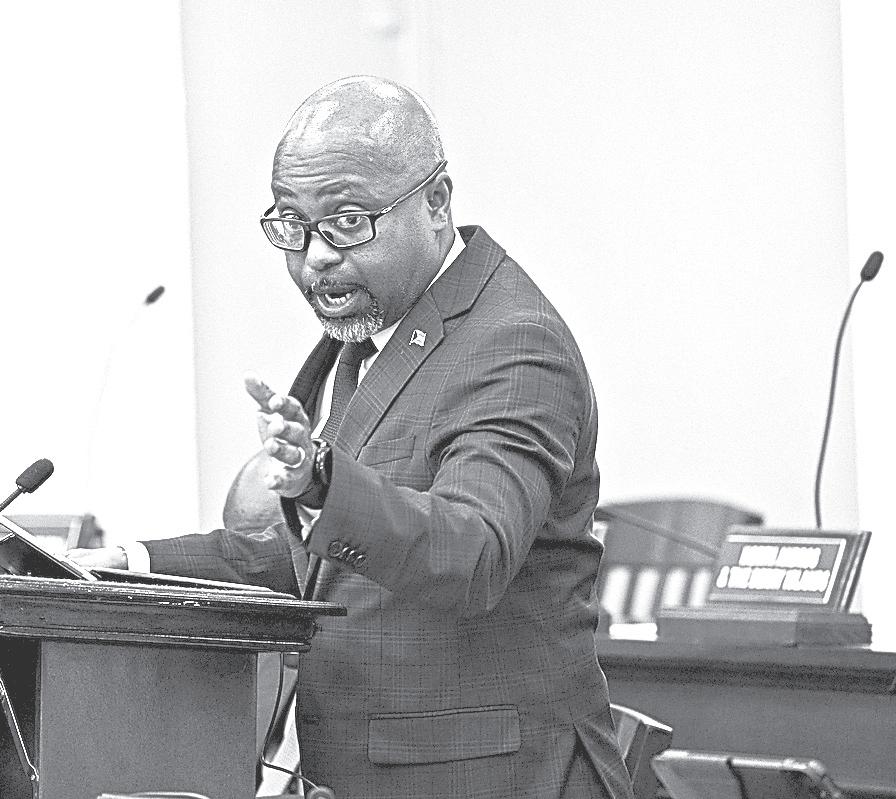
continued going to Ayton’s home after the alleged abuse, suggesting the teen’s explanation — that Ayton took his phone — was unconvincing. He also noted inconsistencies in the complainant’s stated age at the time.
The defence cast doubt on allegations that Ayton pinned the teen with one hand while simultaneously applying lotion, penetrating him with a finger, and putting on a condom. Mr Gray argued the physical differences between the two made this implausible, stressing the complainant was a fit young athlete.
He insisted the complainant was lying, describing the account as “out of this world”, and reminded jurors that Ayton voluntarily went to police and cooperated fully.
Prosecutors countered that the complainant delayed reporting because of shame and had no reason to testify falsely. They said his testimony was credible, noting he was underaged during the alleged incidents.
They argued Ayton and the complainant’s friend were not trustworthy witnesses, pointing to continued contact between the two and claiming Ayton coached him on what to say.
Prosecutors told jurors Ayton was trying to “play” them and dismissed his explanation that the complainant knew what his house looked like from Zoom calls or beach meetings. They argued those would not have revealed the details the complainant described, including a bathroom in the defendant’s bedroom.
They said it was inappropriate for underaged athletes to be in Ayton’s home and pointed out the complainant was the only one who could say there was a bathroom in his bedroom.
Prosecutors also cited medical evidence that an uncircumcised penis can appear circumcised when erect. The complainant said Ayton was circumcised, which the accused denied.
Prosecutors argued the complainant’s account of abuse in the gym was supported by his friend’s testimony that squat equipment was there, matching the complainant’s claim he was doing squats when assaulted.
Calling the alleged abuse a breach of trust, prosecutors told the jury this was a simple case. Cashena Thompson and Vashti Bridgewater are prosecuting.
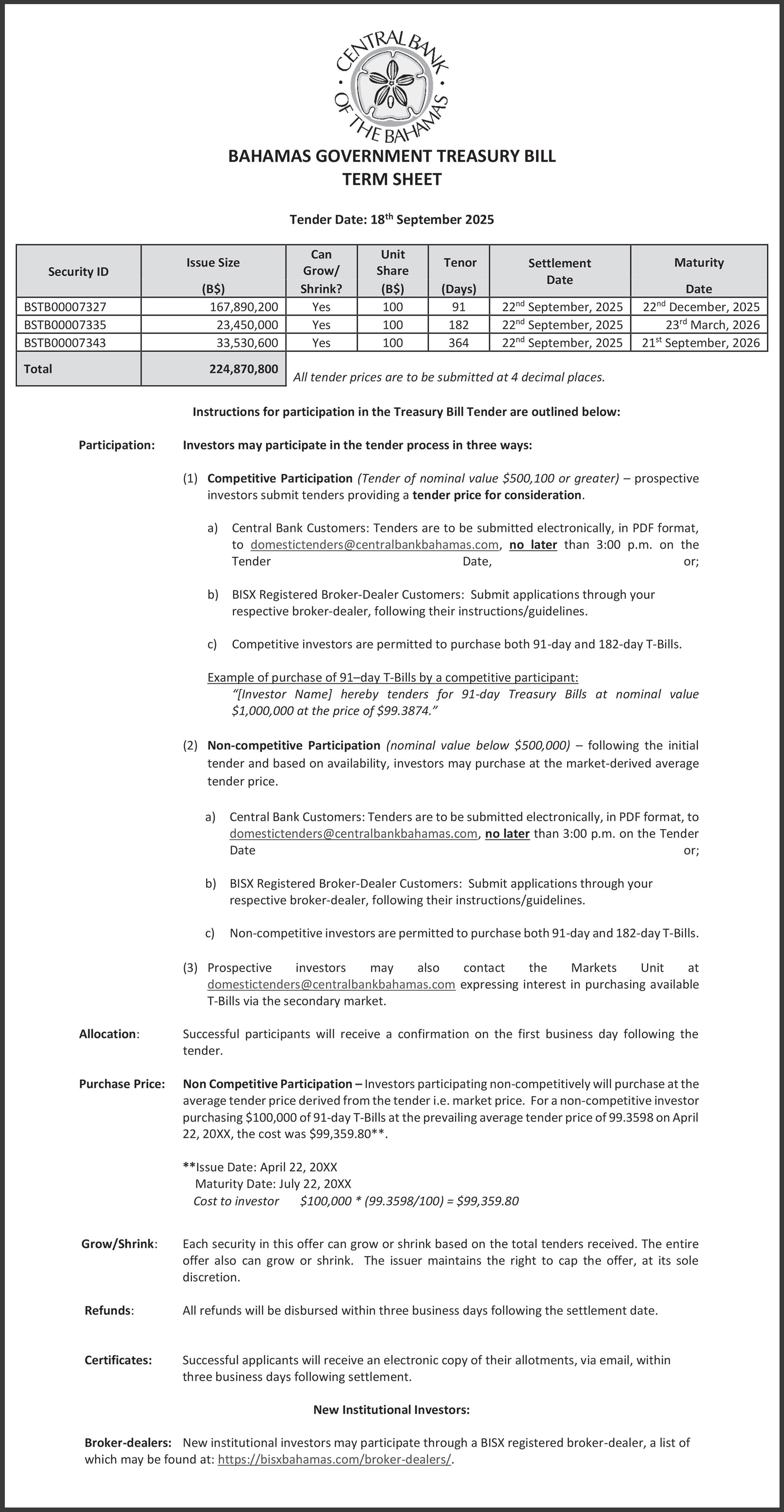
By RASHAD ROLLE Tribune News Editor rrolle@tribunemedia.net
THE Bahamas will soon seat an expert committee to draft its first national policy on artificial intelligence, Attorney General Ryan Pinder said yesterday, warning that AI carries both great promise and serious risk.
“When it comes to the use of artificial intelligence you might hear arguments on all of this, AI can provide tremendous benefit for the industry or pose significant threats,” Mr Pinder told bankers at the Association of International Banks & Trust Companies - The Nassau Conference. He said the government will prepare “a comprehensive AI country policy” that will include “a true SWOT analysis of utilising AI in all elements of our country,” with the financial services industry as a priority.
Mr Pinder described AI as a double-edged sword, noting that it can streamline operations, improve risk management and enhance customer service, but also enable fraudsters, spread misinformation, compromise data security and even replace the investment analysis on which financial
institutions rely.
Other countries have already moved to address these same challenges. The European Union last year enacted the world’s first comprehensive AI law, the AI Act, which classifies systems by risk level and imposes strict requirements on those deemed high-risk. Providers must show that their systems use reliable data, maintain proper documentation and allow for human oversight, while the most dangerous applications, such as social scoring, are banned outright.
In the United States, former President Joe Biden signed an executive order in October 2023 directing agencies to evaluate and monitor AI systems before and after deployment, with a focus on cybersecurity, civil rights and transparency. A follow-up White House memorandum in March 2024 imposed detailed governance and risk-management rules on federal use of the technology.
Britain has opted for a “pro-innovation” approach, placing AI oversight in the hands of existing regulators rather than creating a new agency. It has also established an AI Safety Institute, which the government intends to strengthen
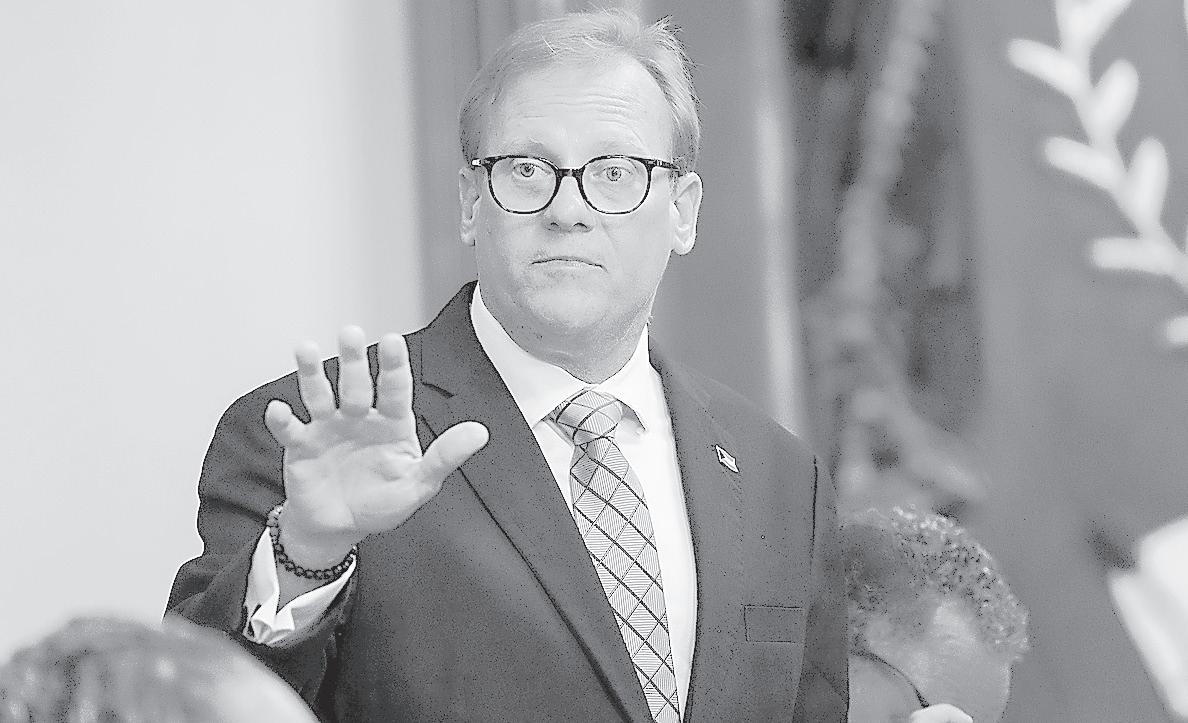
with new legislation to make developer safety commitments legally binding.
Jamaica earlier this year unveiled recommendations for a national AI policy, focusing on ethical use, privacy safeguards and the integration of AI in education and public services.

ATTORNEY GENERAL RYAN PINDER
A TWO-YEAR-OLD boy is in hospital after nearly drowning at a beach on Great Harbour Cay on Tuesday night.
Police said the child was walking along the beach with his mother just before 9pm when he fell into a sinkhole.
She pulled him out unresponsive and rushed him to the island’s clinic where doctors revived him. He was later airlifted to New Providence for further medical treatment
Police said investigations are continuing.

to look at it, to decide and determine what would be the best course of action for the country and move forward with that. However, whatever the citizens of Haiti (are) feeling that’s going to be on them. Until the country is stable, we have to do everything on our part to ensure that our borders are protected.”
concerned about Haiti’s ongoing instability and are focused on closing gaps in the legal migration process.
Mr Davis said on Tuesday that the government is weighing whether to impose tougher visa restrictions on Haitians, noting officials remain
Mr Telairin stressed The Bahamas must protect its borders “by every means necessary,” adding: “I fully agree with him, and I think for most part,


many of the Haitian community agree that with all that is taking place in Haiti, there has to be some revision on what should take place and how the methods should run its course, so that it would be done properly across the board.”
Immigration rights
activist Louby Georges also weighed in, saying he does not object to tighter rules but opposes a complete ban, arguing that some Haitians have legitimate reasons to visit The Bahamas and leave within the required timeframe.
Mr Georges suggested stronger
monitoring measures, including requiring host names and addresses, would allow authorities to better track whether visitors depart on time. He acknowledged, however, that irregular migration will likely continue because of the desperation many face in Haiti.

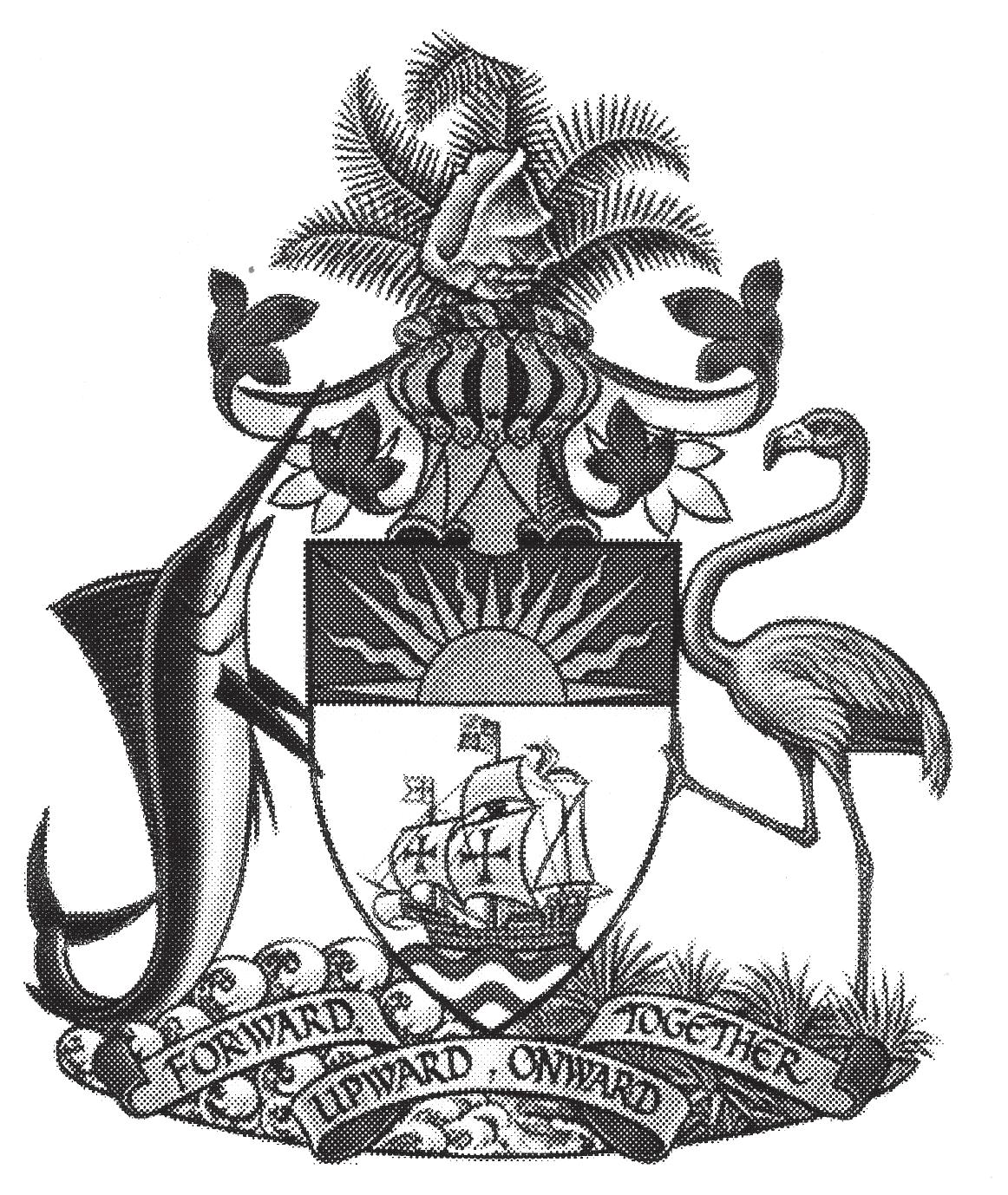
VACANCY FOR VICE PRINCIPAL CENTRAL SECONDARY SCHOOL
SCALE S6
(DEPARTMENT OF EDUCATION)
MINISTRY
Letters of Interest and completed Applicant’s Information Forms are invited from suitably qualified Bahamians presently serving in the Public School System to fill the post of Vice Principal Central Secondary School, Scale S6, in the Department of Education, Ministry of Education and Technical and Vocational Training, for the beginning of the 2025/2026 academic year.
Please note that this position will not be filled if the anticipated vacancy does not materialize
Persons who were appointed to this post by the Public Service Commission and are acting to test suitability for substantive promotion need not re-apply.
Requirements for the post:
1. A Bachelor’s Degree;
2. Professional Teaching Qualification from an approved institution;
3. A minimum of ten (10) years of experience as either a Trained Teacher and/or a School Administrator;
4. A minimum of three (3) years excellent administrative experience as a Principal Grade ‘D’, Vice Principal Grade ‘C’, or Senior Master/Mistress, Primary Schools, Scale S9; and 5. Must be computer literate.
The successful candidate will be expected to:
• Assist the Principal in all aspects of instructional and administrative leadership;
• Be committed to the philosophy of education;
• Possess excellent leadership, organizational and interpersonal skills; and
• Be knowledgeable about and capable of utilizing current trends and techniques which contribute to student development; and
• Accept posting on another island for a minimum of three (3) years if the vacancy is outside of the island of domicile.
Specific duties of the post include:
• Leading the development, implementation and evaluation of all school programmes and activities;
• Providing and supervising an effective discipline system;
• Communicating with the Superintendent regularly about the needs, successes and general operation of the school;
• Establishing and promoting high standards and expectations for all staff and students, for academic performance and responsible behaviour;
• Supervising instructional programmes of the school, ensuring that they address students’ needs, interests and skill levels;
• Overseeing financial and personnel management, procurement and distribution of resource materials and the maintenance of healthy and safe facilities; and
• Completing any other duties that may be assigned by the appropriate education authorities within the Department of Education.
The salary of the post is in Scale S6 - $39,200x$700–$51,100 per annum (July 2024 Salary Scales)
Documents that MUST be submitted, via the online application form, are as follows:
i. A Letter of Interest, with the applicant’s authentic signature, indicating the specific post, scale and island for which the applicant wishes to be considered;
ii. A completed Applicant’s Information Form, with the applicant’s authentic signature;
iii. Certified copies of all academic and professional documents (see Requirements for the post);
iv. A letter from the MINISTRY OF THE PUBLIC SERVICE, confirming the applicant’s appointment to his/her current substantive post; and
v. A recent passport-sized photograph (no more than 2”x2”) – copied on to the Information Form or the Letter of Interest.
In order to submit use link: https://forms.office.com/r/xDG1MPXjWw
It is the responsibility of the applicant to provide certified proof of all relevant academic and professional qualifications and school experience.
Applicants must submit a Letter of Interest and an Applicant’s Information Form, along with supporting documents, copied to their Head of Department, no later than 6th October, 2025
APPLICATIONS TENDERED AFTER THE STIPULATED DEADLINE AND WITHOUT THE REQUISITE DOCUMENTS ARE DEEMED INCOMPLETE AND UNACCEPTABLE.

BEN & JERRY’S cofounder Jerry Greenfield is leaving the ice cream brand after 47 years, saying that the independence it once had to speak up on social issues has been stifled by its parent company Unilever.
In a letter, which cofounder Ben Cohen posted on social media on Greenfield’s behalf, Greenfield said he could not “in good conscience” remain at Ben & Jerry’s — citing a loss of independence to Unilever, which he said had once agreed to give Ben & Jerry’s autonomy around its social mission when it acquired the brand more than two decades ago.
“For more than 20 years under their ownership, Ben & Jerry’s stood up and spoke out in support of peace, justice and human rights, not as abstract concepts, but in relation to real events happening in our world,” Greenfield wrote “It’s profoundly disappointing to come to the conclusion that that independence, the very basis of our sale to Unilever, is gone.”
Ben & Jerry’s, famous for its colourful ice cream containers with flavour names such as Cherry Garcia and Phish Food, has also long been known for its progressive political values — speaking out on a range of social issues over the years. And in his letter late Tuesday, Greenfield noted that the brand’s loss of independence arrived at time in the US when the Trump administration “is attacking civil rights, voting rights, the rights of immigrants, women and the LGBTQ community.” Standing up for the values of justice, equity, and our shared humanity has never been more important, and yet Ben & Jerry’s has been silenced, sidelined for fear of upsetting those in power,” he wrote.
Tensions between Ben & Jerry’s and its parent have heightened in recent years — with the ice cream brand accusing Unilever of silencing its statements in support of Palestinians amid Israel’s war in Gaza, among other conflicts. And Greenfield’s departure also arrives as the consumer product giant, based in London, is spinning off its ice cream business into a stand-alone company called The Magnum Ice Cream Company. In a statement on Wednesday, a spokesperson for Magnum said that it would be forever grateful to Greenfield for his contributions to Ben & Jerry’s and thanked him for his service, but was not aligned with his viewpoint.
“We disagree with his perspective and have sought to engage both co-founders in a constructive conversation on how to strengthen Ben & Jerry’s powerful values-based position in the world,” the spokesperson said — adding that Magnum is still committed to Ben & Jerry’s mission and remains “focused on carrying forward the legacy of peace, love, and ice cream of this iconic, much-loved brand.”
Meanwhile, Greenfield and Cohen have been pushing for Ben & Jerry’s to be allowed to become an independently owned company again, saying in a letter to Magnum’s board that they don’t believe the brand should be part of a corporation that doesn’t support its founding mission.
Ben & Jerry’s has been at odds with Unilever for a while. In March Ben & Jerry’s said that its CEO was unlawfully removed by Unilever in retaliation for the
ice cream maker’s social and political activism.
In a federal court filing, Ben & Jerry’s said that Unilever informed its board on March 3 that it was removing and replacing Ben & Jerry’s CEO David Stever. Ben & Jerry’s said that violated its merger agreement with Unilever, which states that any decisions regarding a CEO’s removal must come after a consultation with an advisory committee from Ben & Jerry’s board.
Unilever said in a statement at the time that it hoped Ben & Jerry’s board would engage in the agreedupon process.
Unilever acquired Ben & Jerry’s in 2000 for $326 million. At the time, Ben & Jerry’s said the partnership would help the progressive Vermont-based ice cream company expand its social mission. But experts stress that preserving complete independence from a corporate owner is never promised.
“What Ben & Jerry’s does spills over onto brand Unilever, and vice versa,” said Kimberly Whitler, a marketing professor at the University of Virginia’s Darden School of Business.
“If a brand wants complete and total autonomy, then it is best to remain independent,” she added.
Tommaso Bondi, an assistant professor of marketing at Cornell Tech, speculates that both Unilever and Ben & Jerry’s “underestimated” conflicts that would arise out of the arrangement — noting that the way that brands now talk about politics and social issues is “completely different” from when this deal was struck 25 years ago. And the size of the parent company today also piles on pressure.
“Unilever is just simply too big to be polarizing,” Bondi said, while speaking out on social issues remains a defining feature of Ben & Jerry’s identity. “In some sense, it was an obvious clash,” he said.
Particularly in recent years, the marriage has been on shaky ground. In 2021, Ben & Jerry’s announced it would stop serving Israeli settlements in the occupied West Bank and contested east Jerusalem. The following year, Unilever sold its Israeli business to a local company that said it would sell Ben & Jerry’s under its Hebrew and Arabic name throughout Israel and the West Bank.
In March 2024 Unilever announced the spinoff of the ice cream business — including Ben & Jerry’s — by the end of 2025 as part of a larger restructuring. Unilever also owns personal hygiene brands like Dove soap and food brands like Hellmann’s mayonnaise.
But the acrimony continued. In November, Ben & Jerry’s sued Unilever in federal court in New York, accusing it of silencing Ben & Jerry’s statements in support of Palestinians in the Gaza war.
In its complaint, Ben & Jerry’s said Unilever also refused to let the company release a social media post that identified issues it believed would be challenged during President Donald Trump’s second term — including minimum wages, universal health care, abortion and climate change. Businesses across sectors have encountered growing pressure to take a backseat when it comes to social activism today — particularly amid the Trump administration’s wider crackdown on diversity, equity and inclusion efforts in both government and workplaces across the US
